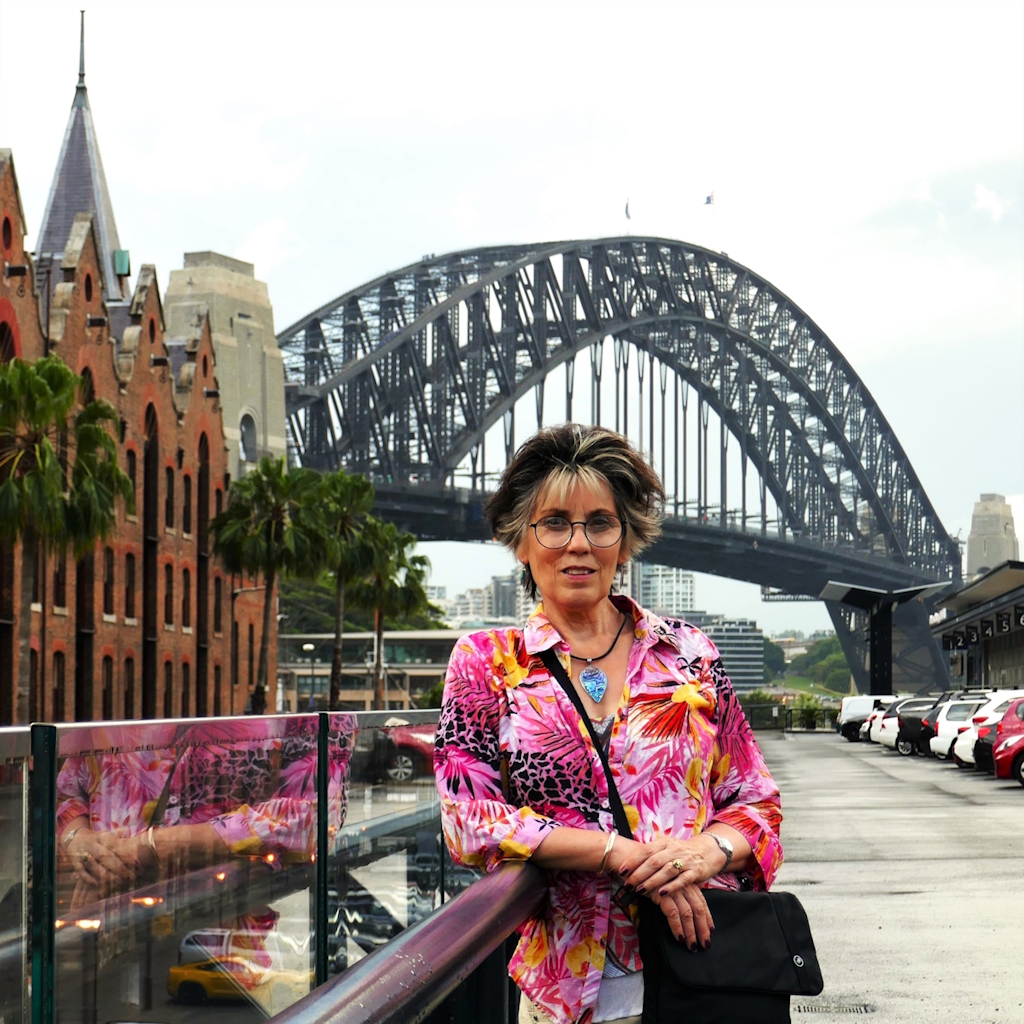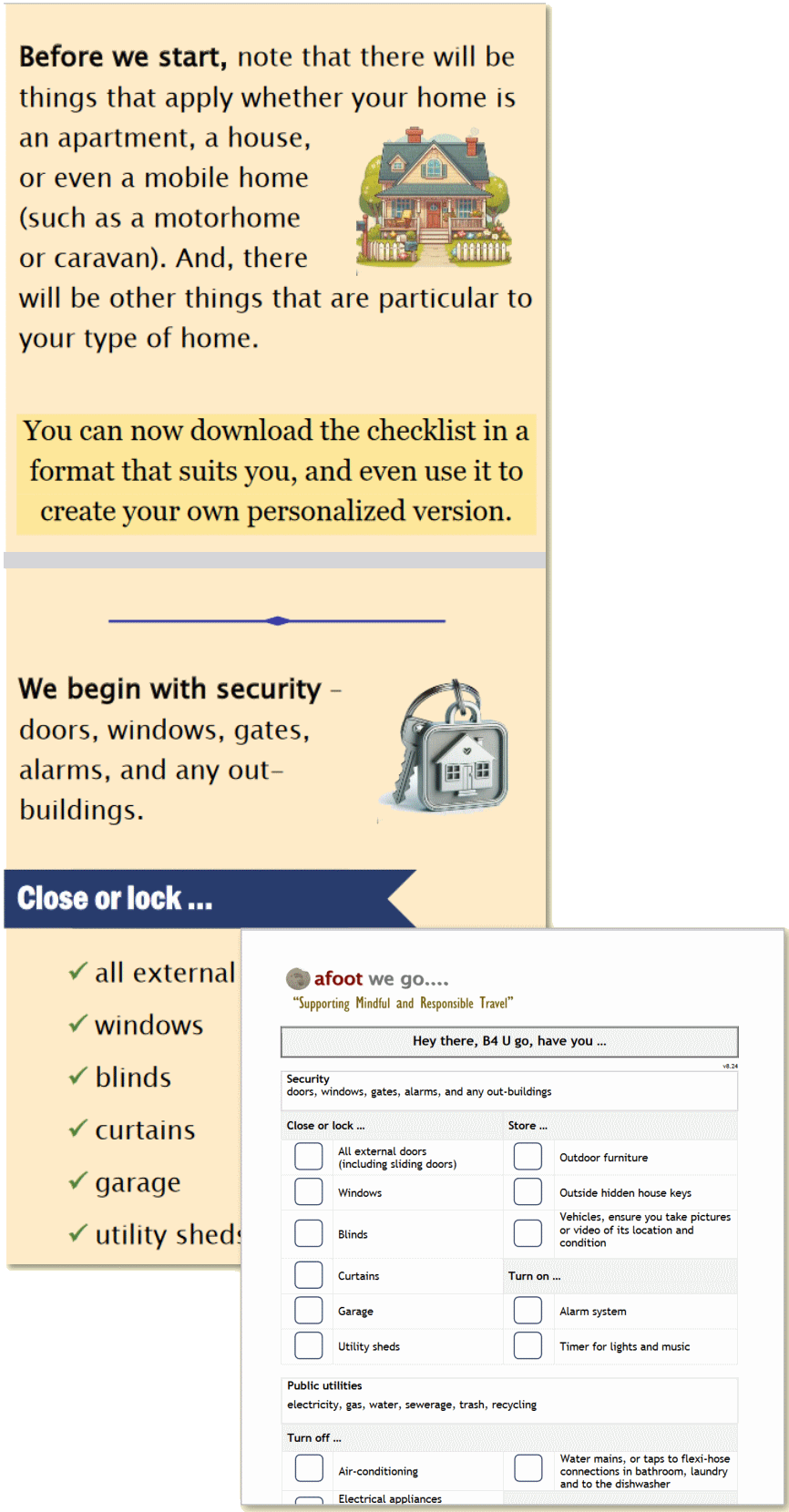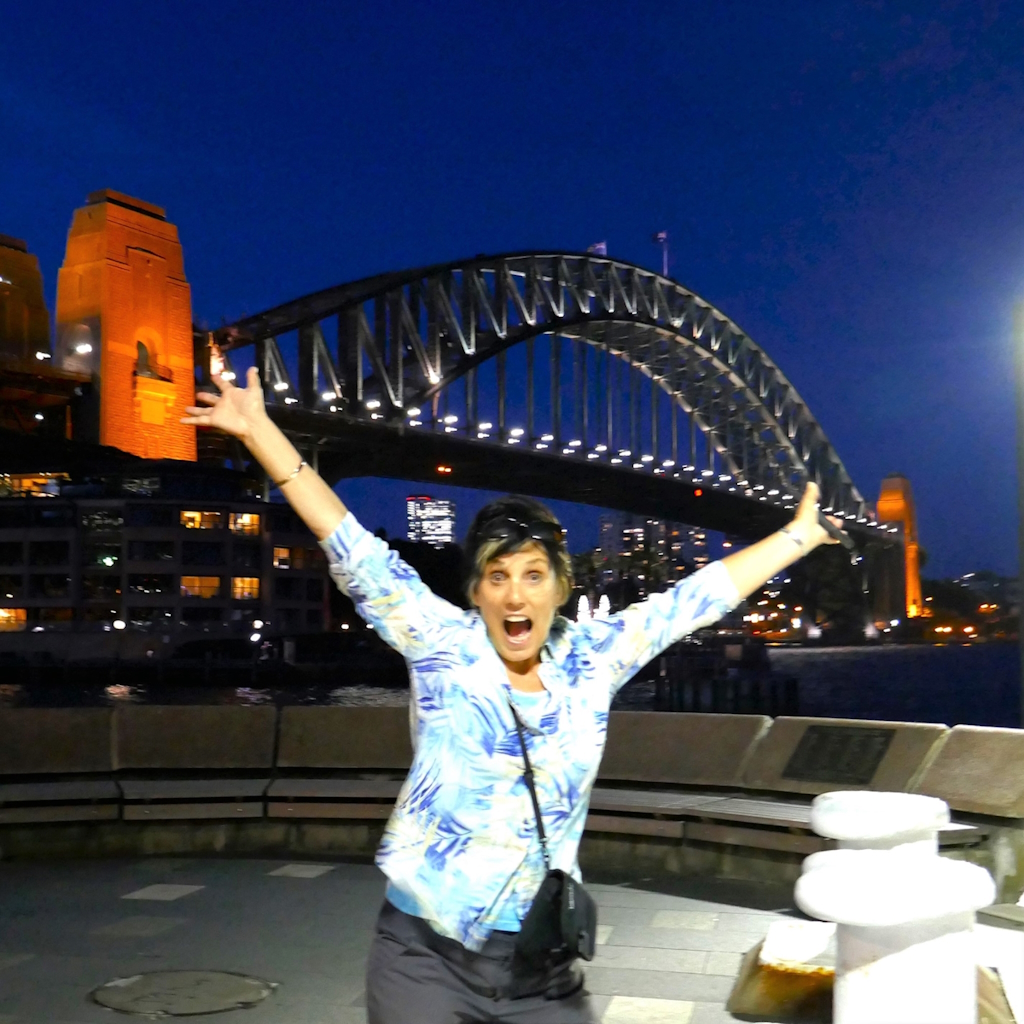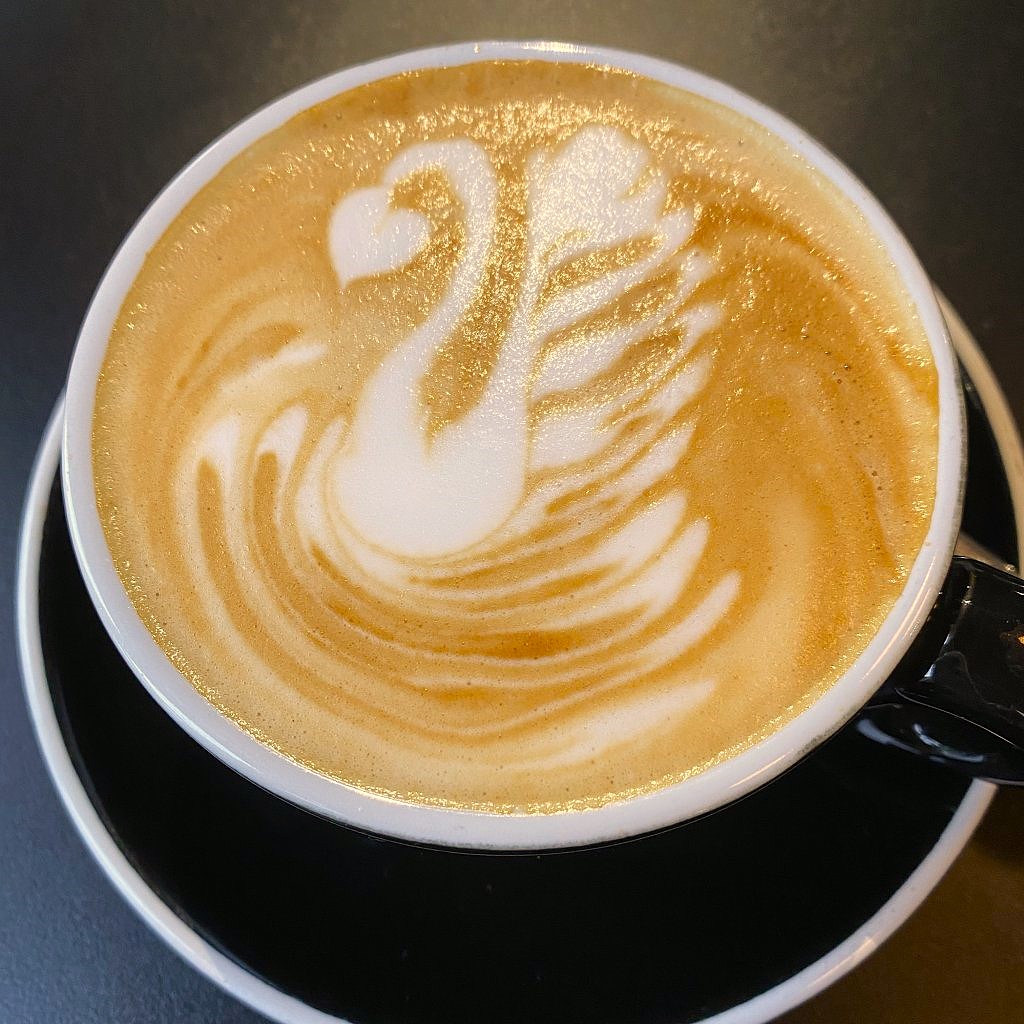afootwego-01-what-to-do-in-sydney-10-quick-ideas
afootwego Posts + Stories template
…for people who love to walk…
Supporting Mindful and Responsible Travel
The afootwego Post 10 Quick Ideas For Things to Do in Sydney offers choices of year-round attractions
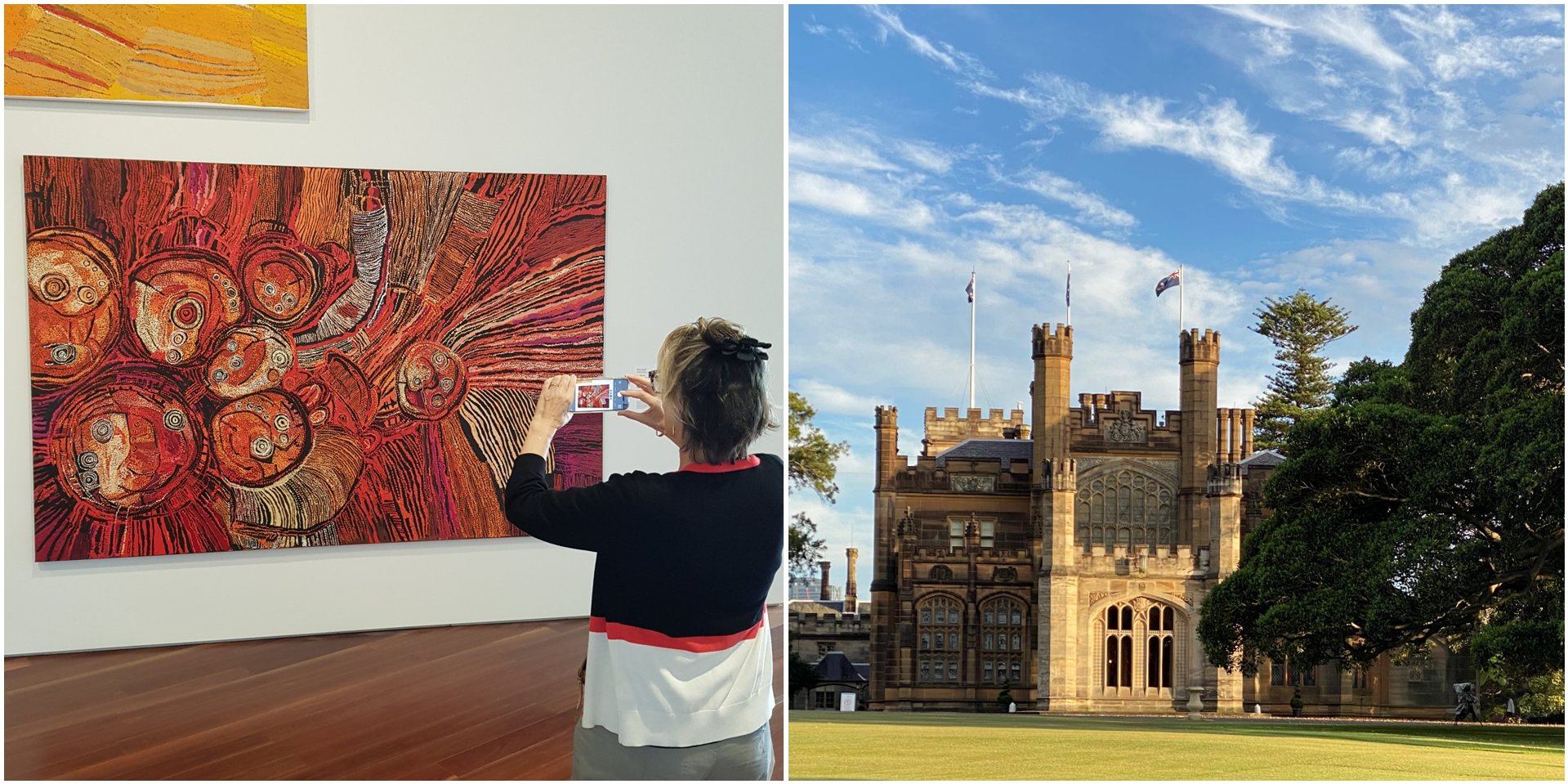
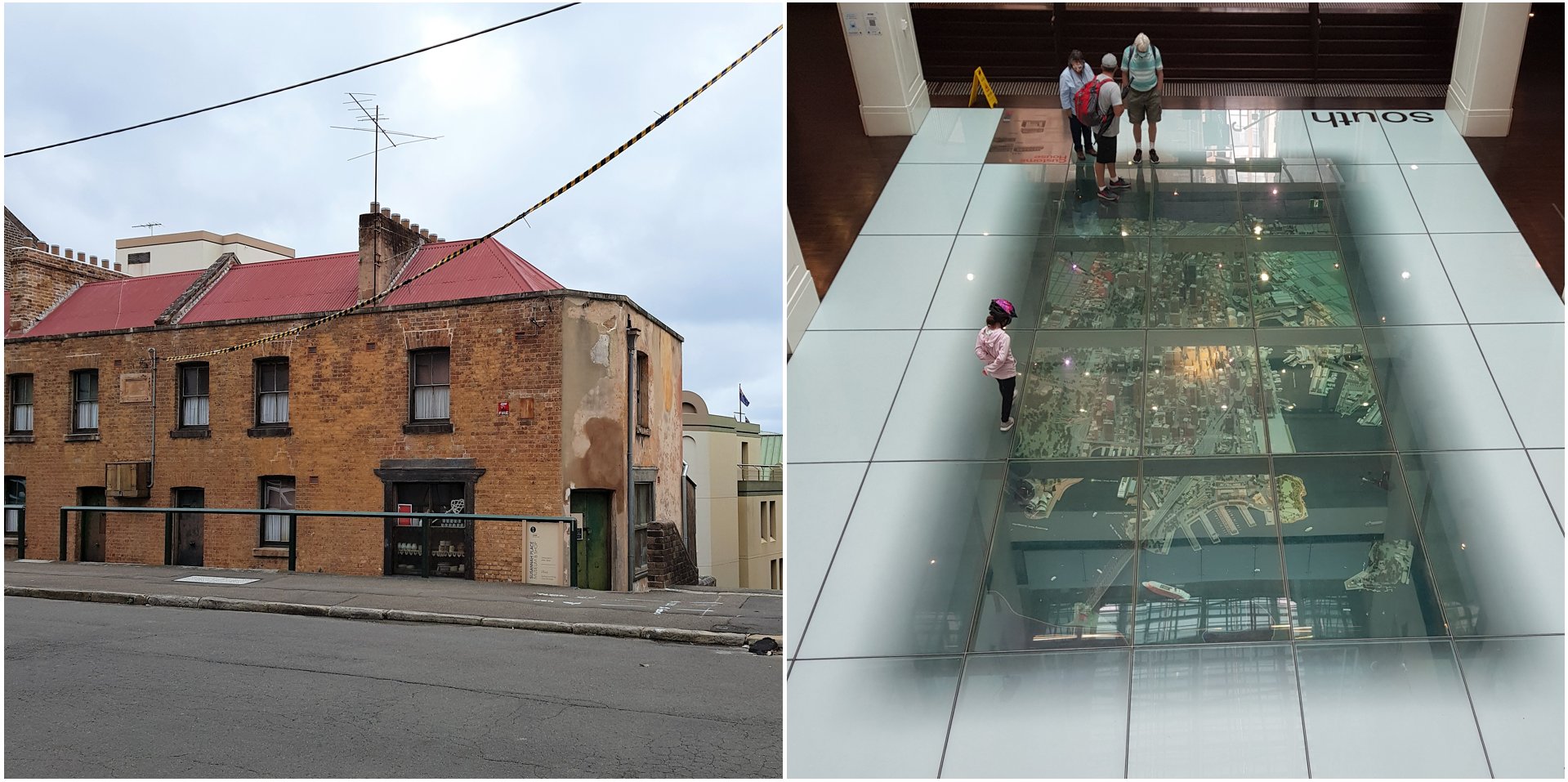
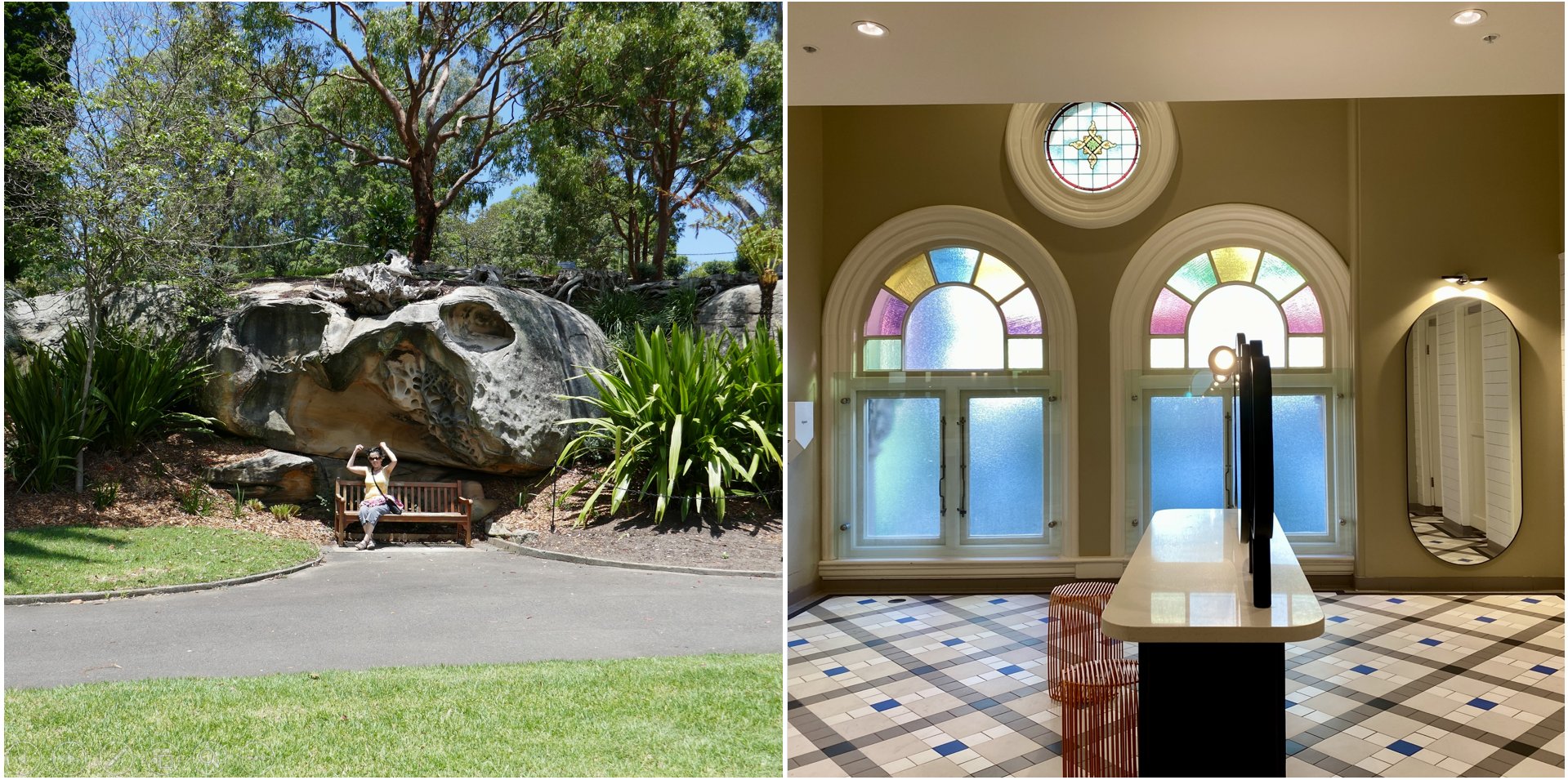
What to Do in Sydney – 10 Quick Ideas for FREE Updated Nov 2025
Jan 2025
22
I call Sydney a ‘City in a Playground’ because it offers a range of choices of year-round attractions, which appeal to all interests, and to all generations.
Being built around one of the most beautiful harbours in the world, and being surrounded by National Parks and nature reserves, makes Sydney the ultimate outdoors city.
But it’s more than that, offering opportunities for high-end shopping, both within the inner-city area, and in several of the outer suburbs. And for food-lovers, Sydney’s cuisine scene reflects the wide diversity and multiculturalism of its population.
For those with a bent towards the arts, impressive collections are found in the NSW Art Gallery and the NSW State Library. And when it comes to the Theatre, there’s at least one place worth checking out: The Sydney Opera House.
Staying with the arts, but moving outdoors, some notable pieces of street art can be found in the suburbs of Newtown and Chippendale, and at Bondi Beach. And, for anyone with a little energy to burn, surviving examples of First Nations Rock Art, up to 6000 years old, can be found near Bondi and near Manly.
In this Post, I am offering suggestions for 10 things you can do in Sydney, mostly either within the CBD, or quite close to it.
These are offered with the budget-conscious thrifty traveler in mind, as most are either FREE, or are easily affordable. They will especially suit someone who is on a short stay of 2, 3, or 4 nights, and who is pressed for the time to develop their own itinerary.
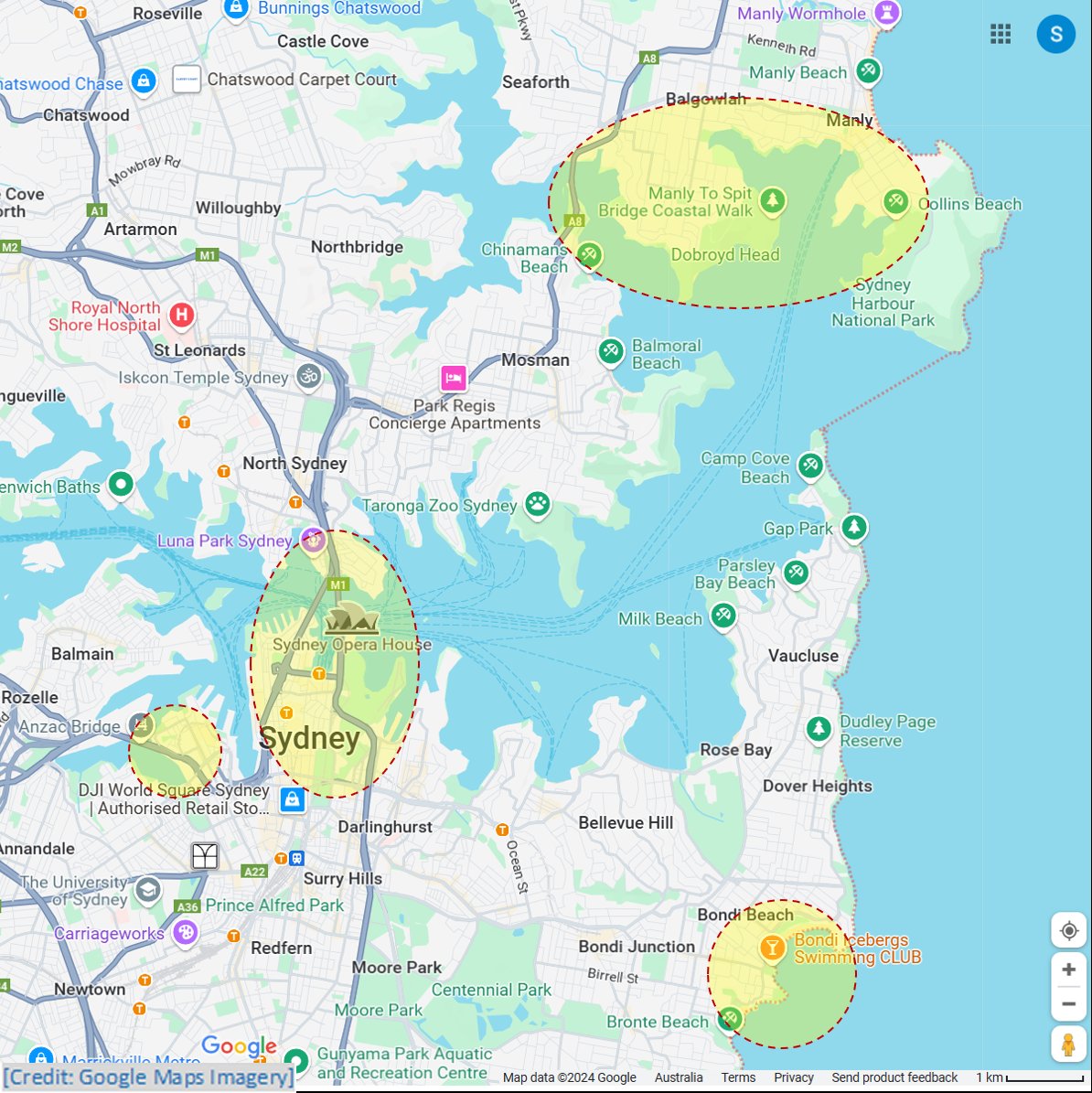
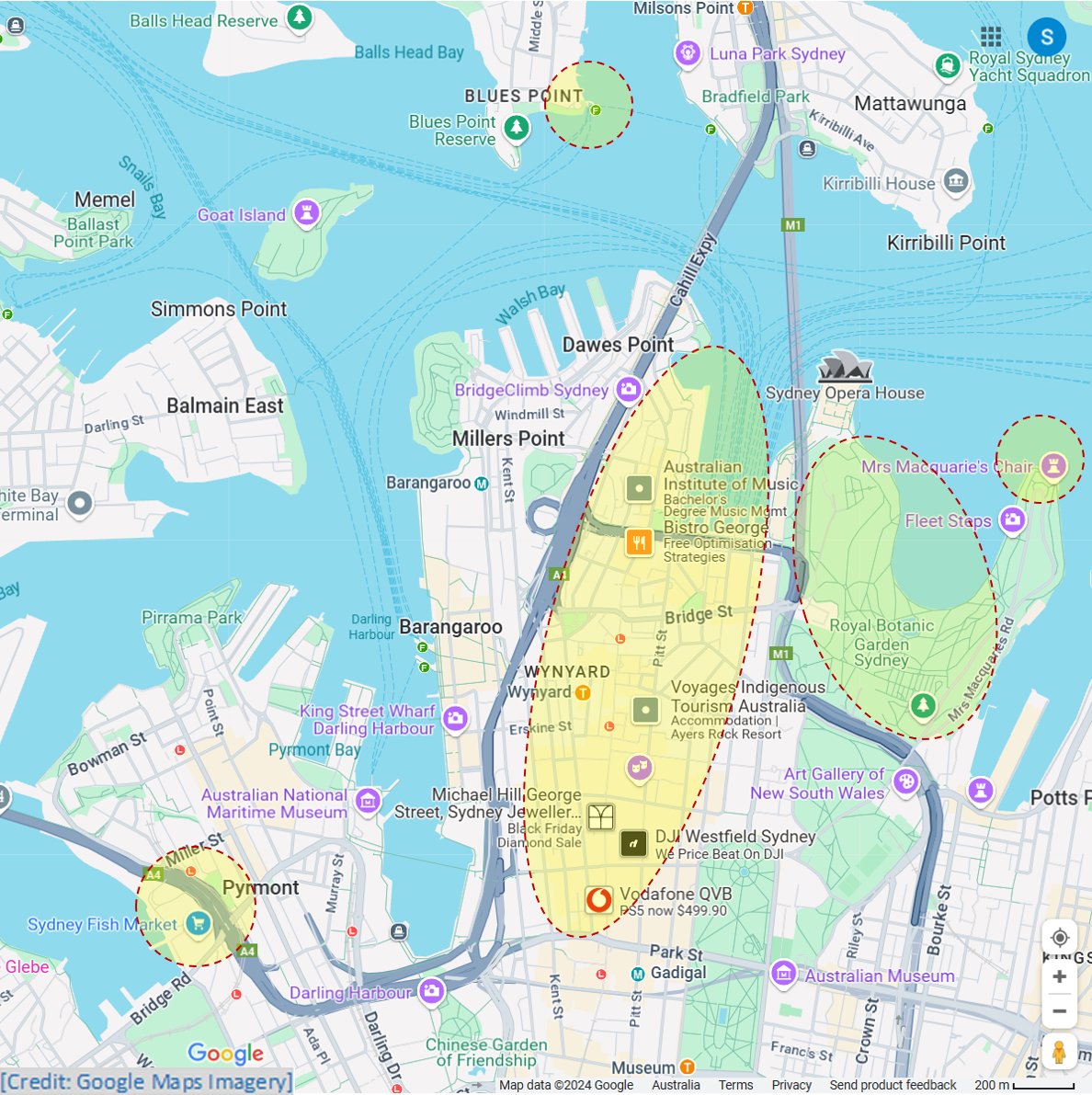
10 Quick Ideas – FREE Things to Do
Let’s explore some of Sydney’s Free or Low-cost Attractions:
- 1. Australia’s First Nations Art is Special!
Visit the NSW Art Gallery, Australian Museum, Museum of Contemporary Art; also find First Nations Rock Engravings at Bondi and at Manly… - 2. Discover Weird and Wonderful in Sydney’s CBD
Take a Self-Guided Walk around Sydney’s CBD, and investigate the stories of some of inner Sydney’s more unusual attractions… - 3. Take in a Bird’s-Eye View of Sydney’s CBD
Inside Sydney’s old Customs House, hiding in plain sight, is a little-known gem that every visitor to Sydney should come and see… - 4. There’s More Than Fish at the Sydney Fish Market
Before the Europeans arrived, the Gadigal people of Sydney relied on the sea for much of their food; seafood has been on the menu in Sydney for eons… - 5. Step Inside the Splendour of Government House
Planned more than 200 years ago, Government House has dominated the harbour approach to Sydney Cove and Circular Quay since 1845… - 6. Explore these Grand Stables, and Enjoy the Talent
Were these Castellated Stables Governor Macquarie’s greatest folly, or were they his ultimate success in ensuring the future development of Sydney… - 7. In the CBD, And NEED to PEE? Here’s Where to Go!
Standing today on the site of one of Sydney’s early marketplaces, in the 1960s QVB was almost lost to the wrecker’s ball – can you believe that… - 8. Turn the Clock Back for Life in Sydney in 1844
Imagine life as a grocer at The Rocks, during Sydney’s severe economic depression of the 1840s – this was the way in a ‘boom and bust’ colony… - 9. Take a Nature Ramble Beside Sydney’s CBD
Farm Cove promised so much for the settlers of the First Fleet, but it delivered so little that they were soon on starvation rations… - 10. A Selfie with the Coathanger, or the Sails (or Both)
Two world-famous Australian Icons, and You can get Your selfie with each, from the very same spot at Circular Quay – here’s HOW…
Useful links:
This bookmark will take you to links for:
Vehicle Parking and Mobility Parking
Acknowledgement of Country
We acknowledge the Gadigal, Gayamaygal, Cammeraigal, Borogegal, Bidjigal, and Wallumedegal people of the Eora Nation as the Traditional Custodians of the lands described in this Post, and we pay our respects to their Elders, past, present, and emerging.
We recognise that although the peoples of the Eora Nation may no longer be the title-holders to these lands, they are still connected to the culture and Country of their ancestors, and as custodians of their culture, legitimately consider themselves caretakers of their Country.
We also extend our respects to all other First Nations peoples across Australia, and support the continuation of their cultural, spiritual and educational practices.
Australia’s First Nations Art is Special!
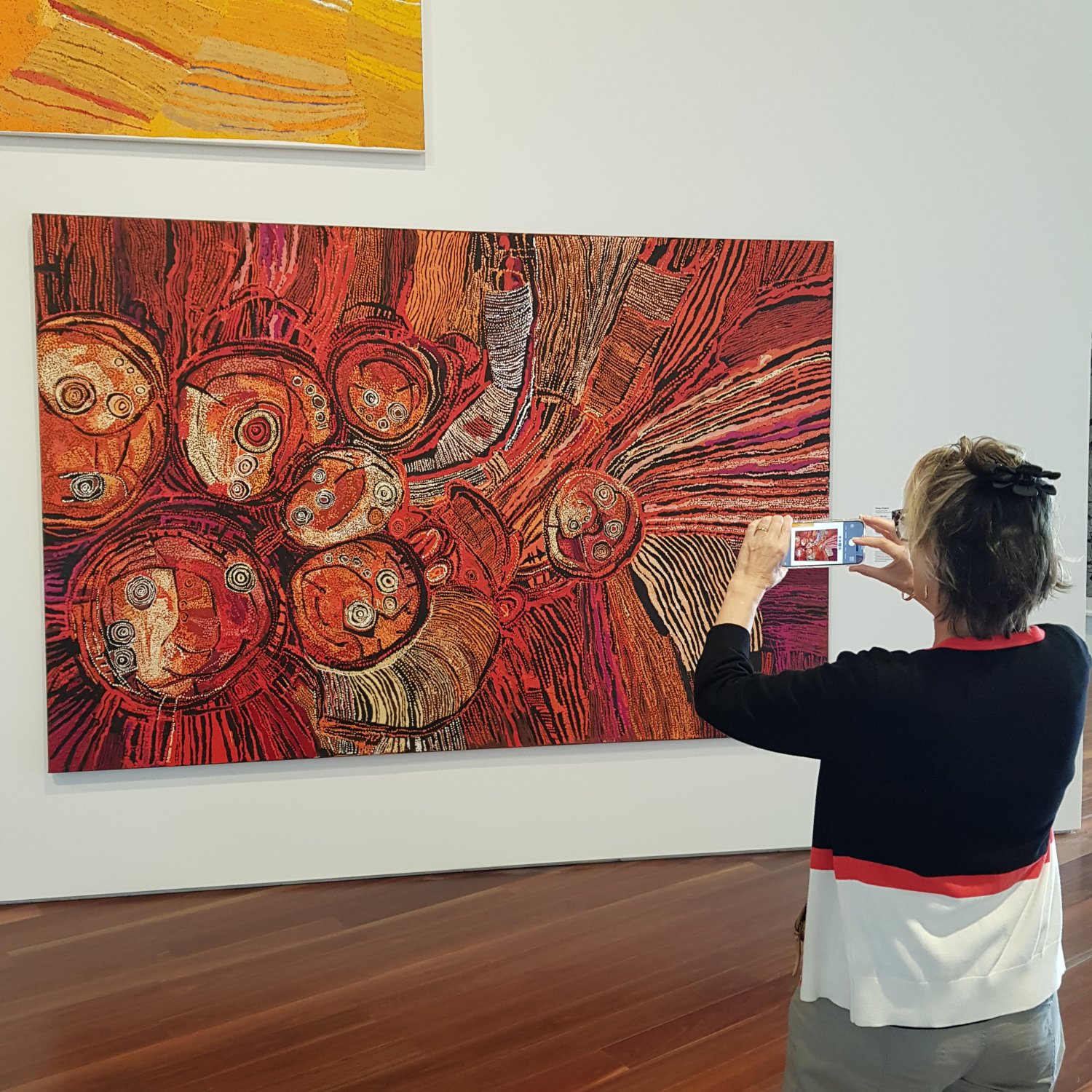
The Art Gallery of NSW holds over 500 painted works by Australian First Nations artists
Australia’s First Nations Rock Art includes pieces dated to around 30,000 years ago. Engravings (petroglyphs) and paintings (pictographs) found in the Sydney area are dated to between 3000 and 4000 BC.
Examples of contemporary First Nations art, including dot paintings, often use a selection of vibrant colours. Unfortunately, much of the indigenous artwork offered as low-cost souvenirs is created outside of Australia. Genuine pieces should carry a Certificate of Authenticity.
Sydney has a number of indoor exhibits of First Nations art, including:
The Art Gallery of NSW:
Visit the Yiribana (Eora language for “this way”) Gallery, in the new Naala Badu building.
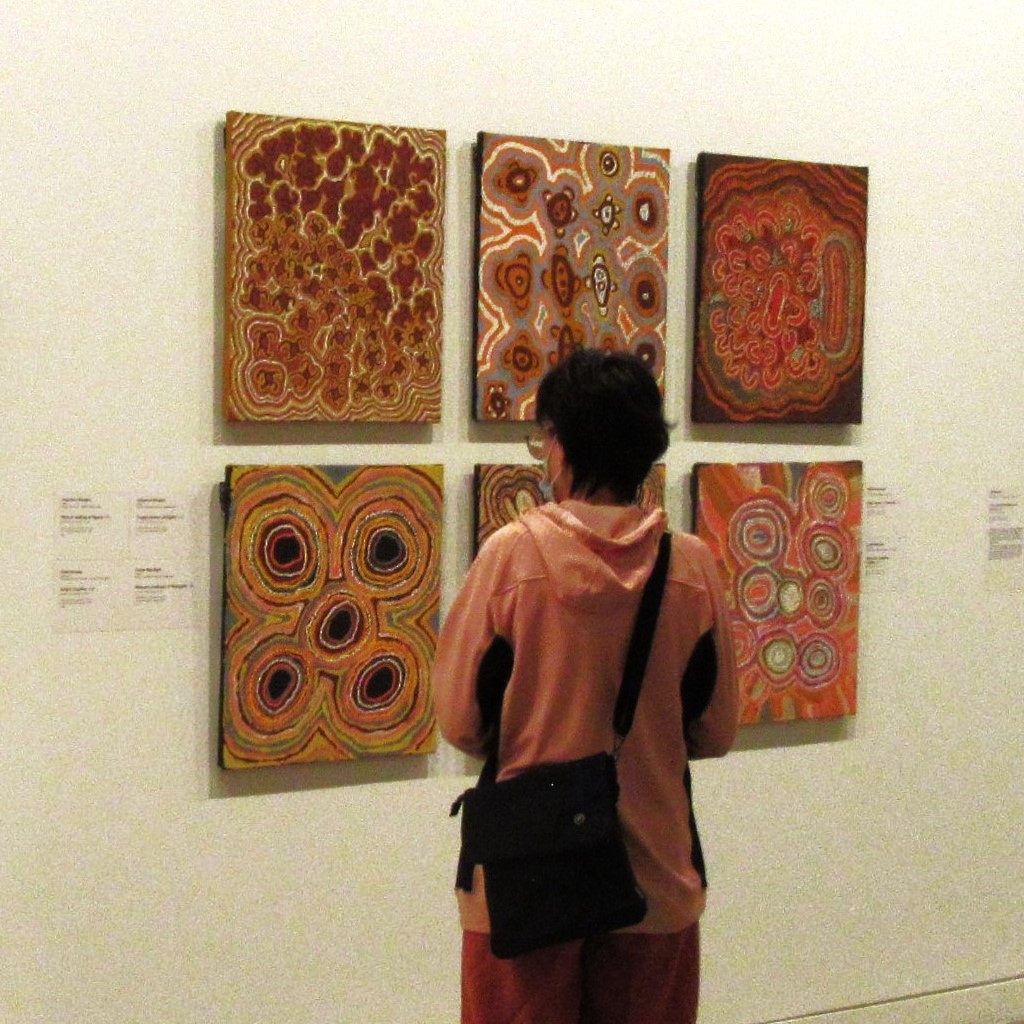
Josphine Nangala, Women resting at Ngyila 1996
Josphine Nangala, Tingali Women at Ngyila 1996
Nanyuma Napangati, Tingari Women at Kanaputa 1996
Tatali Nangala, Artist’s Country 1996
Tjunkiya Napaltjarri, Two Women dreaming at Witjilki 1996
https://www.artgallery.nsw.gov.au/whats-on/exhibitions/yiribana/
Australian Museum:
Visit the permanent exhibition Garrigarrang (Eora for “sea country”), plus there is a wonderful children’s learning space named Burra (Dharug language for “eel”).
https://australian.museum/learn/first-nations/
The Museum of Contemporary Art:
MCA exhibitions regularly display works by Australian First Nations artists. The MCA also hosts an annual young creatives exhibition (young people aged 12–21).
https://www.mca.com.au/first-peoples/
For each of these venues, general entry is free; however, there may be a fee for some exhibitions.
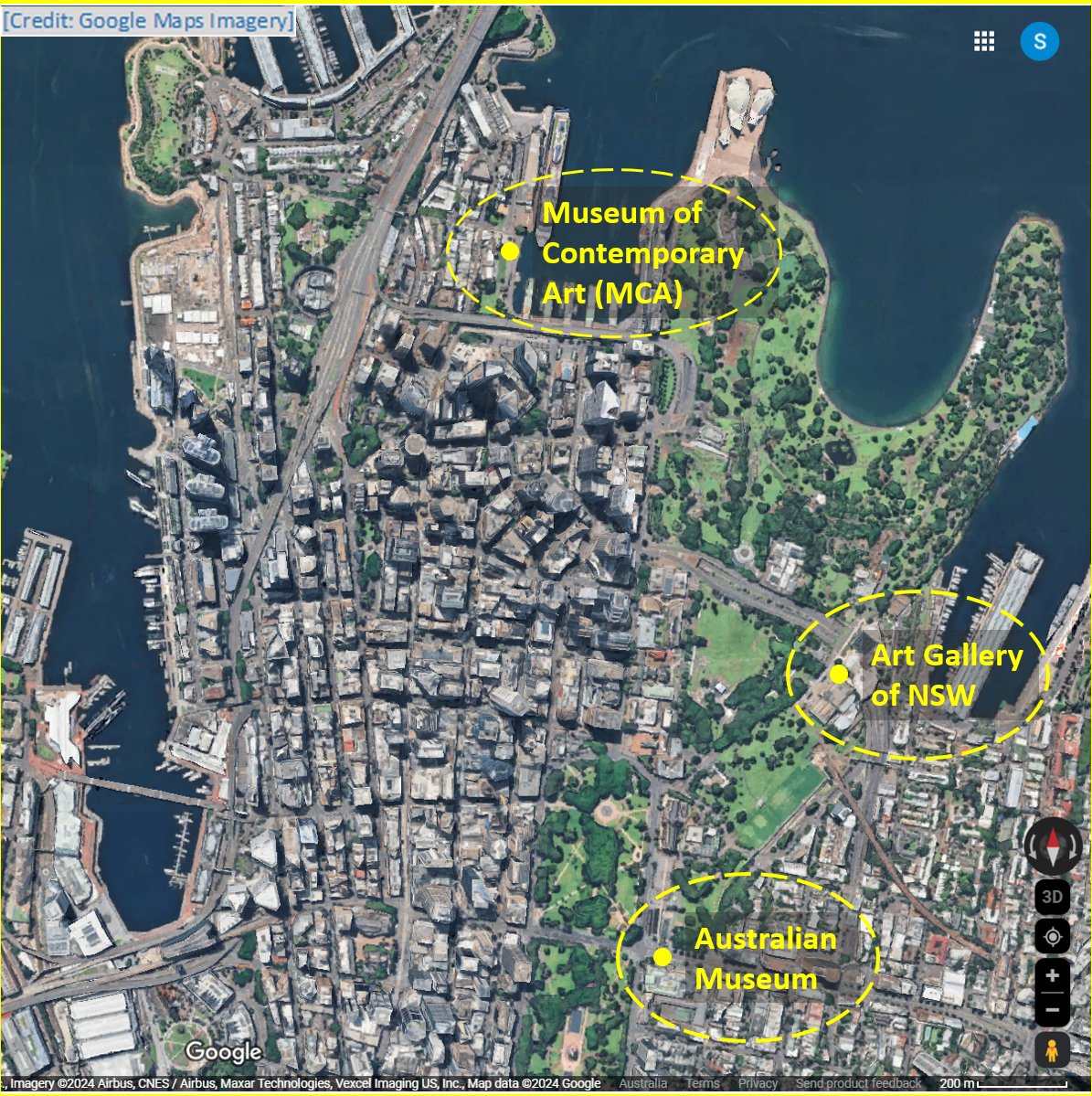
For those who are happy to walk for a bit, there are several outdoor examples of First Nations rock engravings open to public display around Sydney.
Rock Art engravings are a valuable part of the history of Sydney, and of the people who lived here prior to the arrival of Europeans. There are many mysteries surrounding Rock Art engravings, not the least of which is how old they are, and why were they made.
Rock Engravings near Bondi Beach
Near North Bondi, a turtle engraving is found at Ben Buckler Point, beside the steps leading from the Ray O’Keefe Reserve to the Ben Buckler Fisherman’s Club. On the nearby Bondi Golf Course, a collection of engravings, beside the historic North Bondi Sewer Vent (chimney) depicts whales, a human (or possibly a mythological being), a shark and other fish.
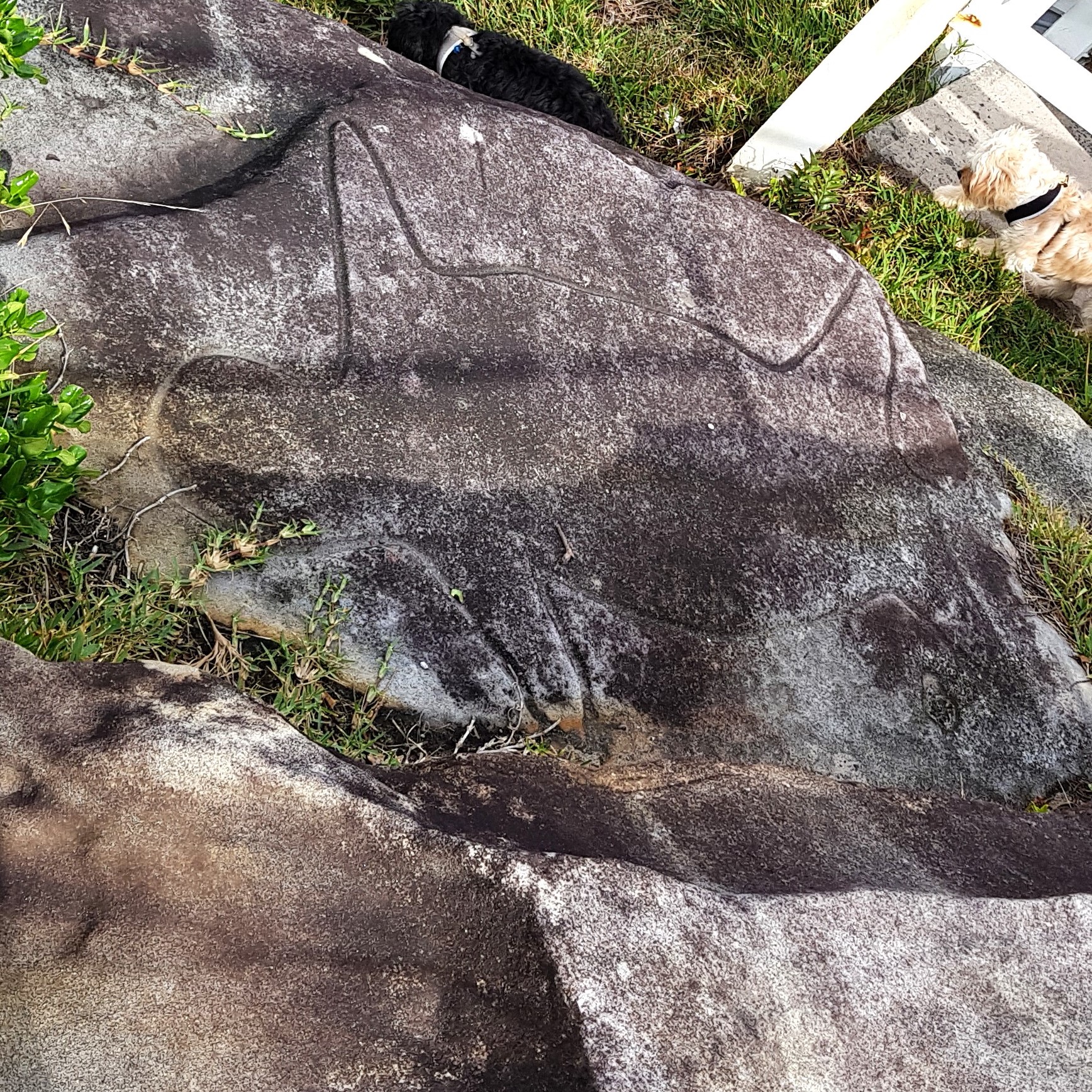
The Ben Buckler Rock Engraving is about 500 meters south of the North Bondi Bus Stop, along Brighton Boulevard and Ramsgate Avenue. The Bondi Golf Course Rock Engravings are about 550 meters north from the North Bondi Bus Stop, along Military Road.
South of Bondi Beach, beside the
Curiously, the best protection from interference and vandalism for such sites is seen to be from NOT publicising their presence.
Alternately, walking towards Bondi means that you are walking with the sun shining into your face. On a sunny, warm day, sunburn is inevitable, unless you take adequate precautions.
Rock Engravings near Manly
Across the Harbour, along the popular 10k
More information is available from the NSW National Parks and Wildlife Service:
Grotto Point Aboriginal engraving site:

by public transport (bus): ±45 min
CBD (Wynyard Station) to The Spit Bridge (Manly Scenic Walk)
by public transport (bus): ±40 min
CBD (Circular Quay) to Manly Wharf
by public transport (ferry): 20-30 min
Getting there:
North Bondi, Bondi Beach, Bronte Beach, and The Spit Bridge are all serviced by city buses (From/To CBD)
Note: for specific directions about arriving at/departing from The Spit Bridge, follow this link:
How to Get to The Spit Bridge
(Using Public Transport)
Manly is serviced by harbour ferries (From/To Circular Quay)
For public transport, use the
https://transportnsw.info/trip#/trip
North Bondi footpaths have inclines and declines, with steps at Ben Buckler
Both Coastal Walkways also have inclines, declines, and steps
Useful link about rock engravings:
https://kids.kiddle.co/Sydney_rock_engravings
Although this is designed for children, I have found it a great resource, and easy to read
Examples of
Discover Weird and Wonderful in Sydney’s CBD
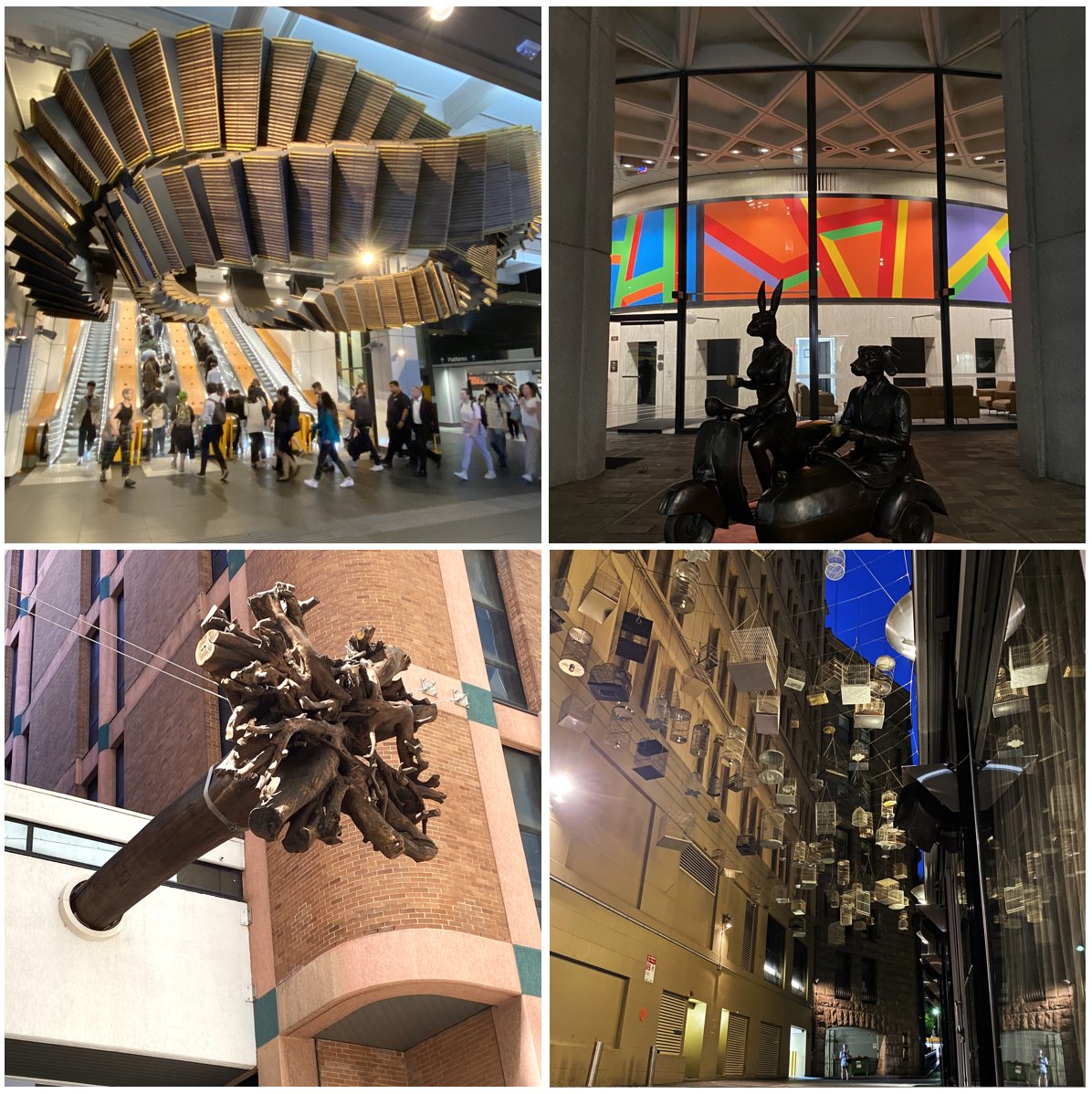
Almost every destination has some attractions that could be described as weird, unique, wonderful, unusual, etc. Within Sydney’s CBD these include:
- a forest giant suspended high above a city street
- a men’s antique +140-year old outdoor dunny, still in working order
- the world’s first ‘upcycled’ skyscraper, given a second life
- a former public housing block for low-paid workers, now home for the exclusively rich
- a sewer vent that has the appearance of a great obelisk
11 of Sydney’s Weird and Wonderfully Unusual attractions have been collected together to make up a 3.3 km (2.0 miles) Self-Guided Walk. The route can be walked end-to-end in around 47 minutes; as a Self-Guided Walk, a likely duration would be 90-120 minutes.
This Self-Guided Walk is offered as an alternative to the classic types of walking tours, i.e. Culture, Food, Nature, Shopping, Architecture, History, etc.
That said, it does delve into the heritage of Sydney’s colonial era, as it visits each of the 11 Attractions.
The start-point for the route is Circular Quay. For full details, checkout the link below.
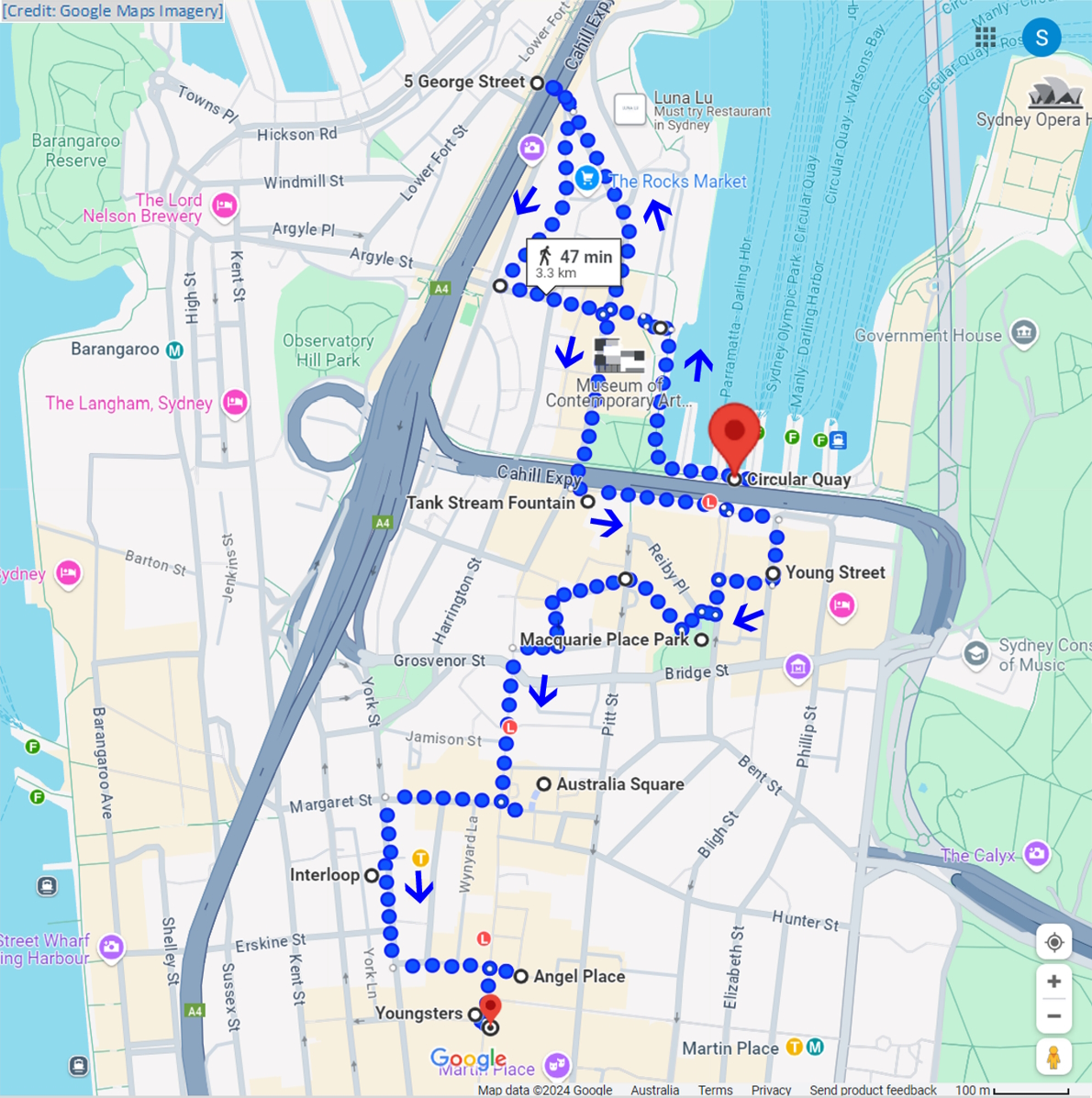
Getting there:
Ferry, train, bus and light rail all connect with Circular Quay
For public transport, use the
https://transportnsw.info/trip#/trip
The suggested route is mostly flat, with some gradual inclines, plus descent of the Argyle Stairs
afootwego.com Post and Self-Guided Walk: 11 Weird and Wonderfully Unusual Sights in Sydney’s CBD:
https://afootwego.com/11-weird-and-wonderfully-unusual-sights-in-sydneys-cbd/
Take in a Bird’s-Eye View of Sydney’s CBD
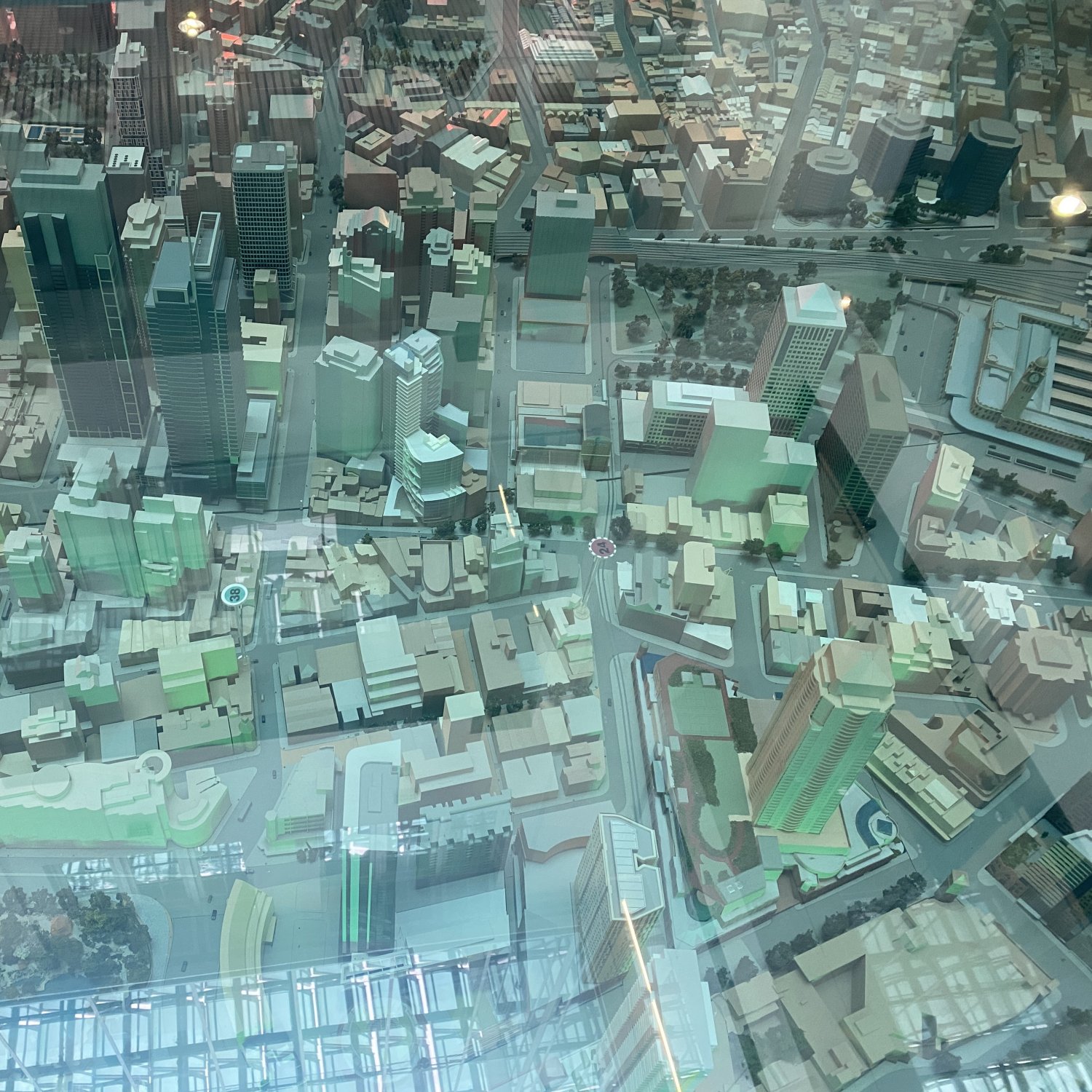
Central Station is near the upper-right corner; the Chinese Friendship Gardens are in the lower-left. Hay Street runs vertically through the middle of this shot, with George Street running horizontally across, also in the middle
If you know where to look, you can take in the sights of Sydney’s CBD, from the Harbour Bridge to Central Station, and from the Royal Botanic Garden to Darling Harbour, without walking more than 50 paces.
Especially for visitors, this offers a really useful perspective of downtown Sydney. Head to the old Customs House, where you will find the scaled model inside the Atrium, beneath the glass floor.
Showing 10 square km, the 4.2 x 9.5 metres (14 ft x 31 ft) model has been on display since before the Sydney 2000 Olympics. It is kept up to date with regular additions to reflect the changing cityscape.
By night, the model is illuminated with hundreds of fibre-optic lights, making quite a spectacle. This involves 36km (22⅓ miles) of fibre-optic cables. Weighing almost 1 tonne, the model contains 1500+ buildings and 5000+ trees.
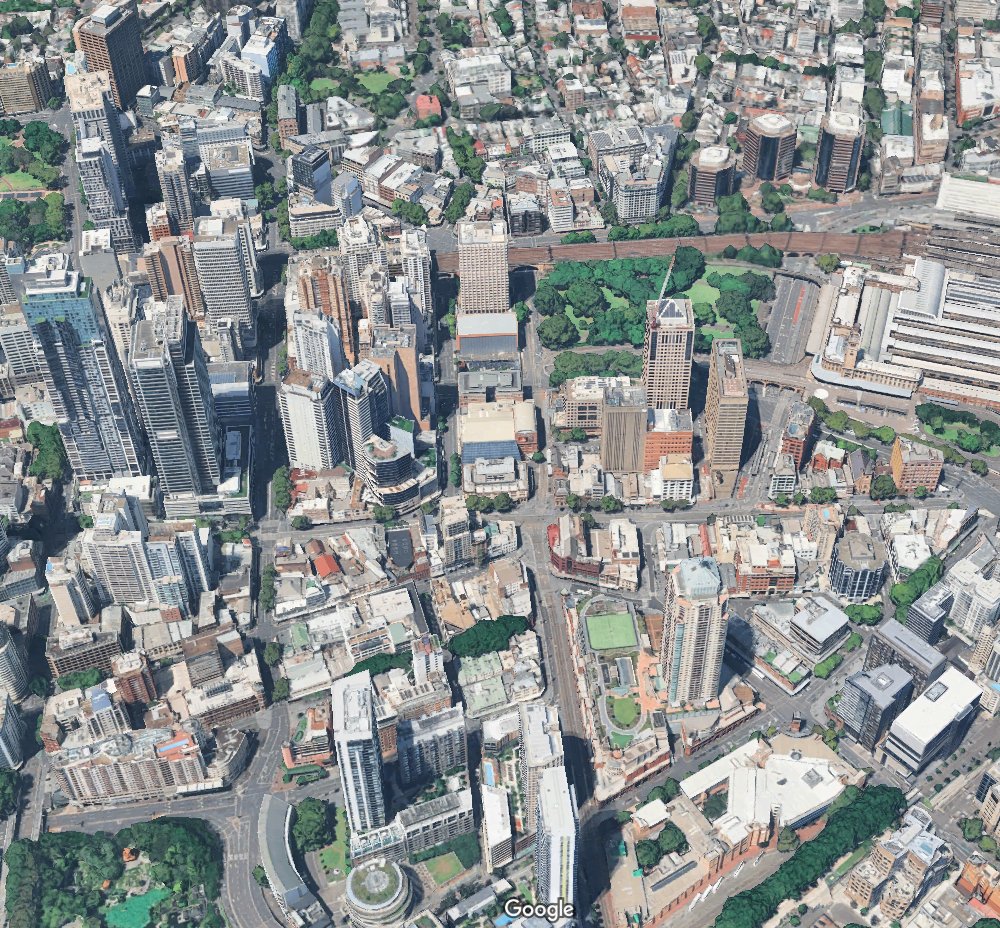
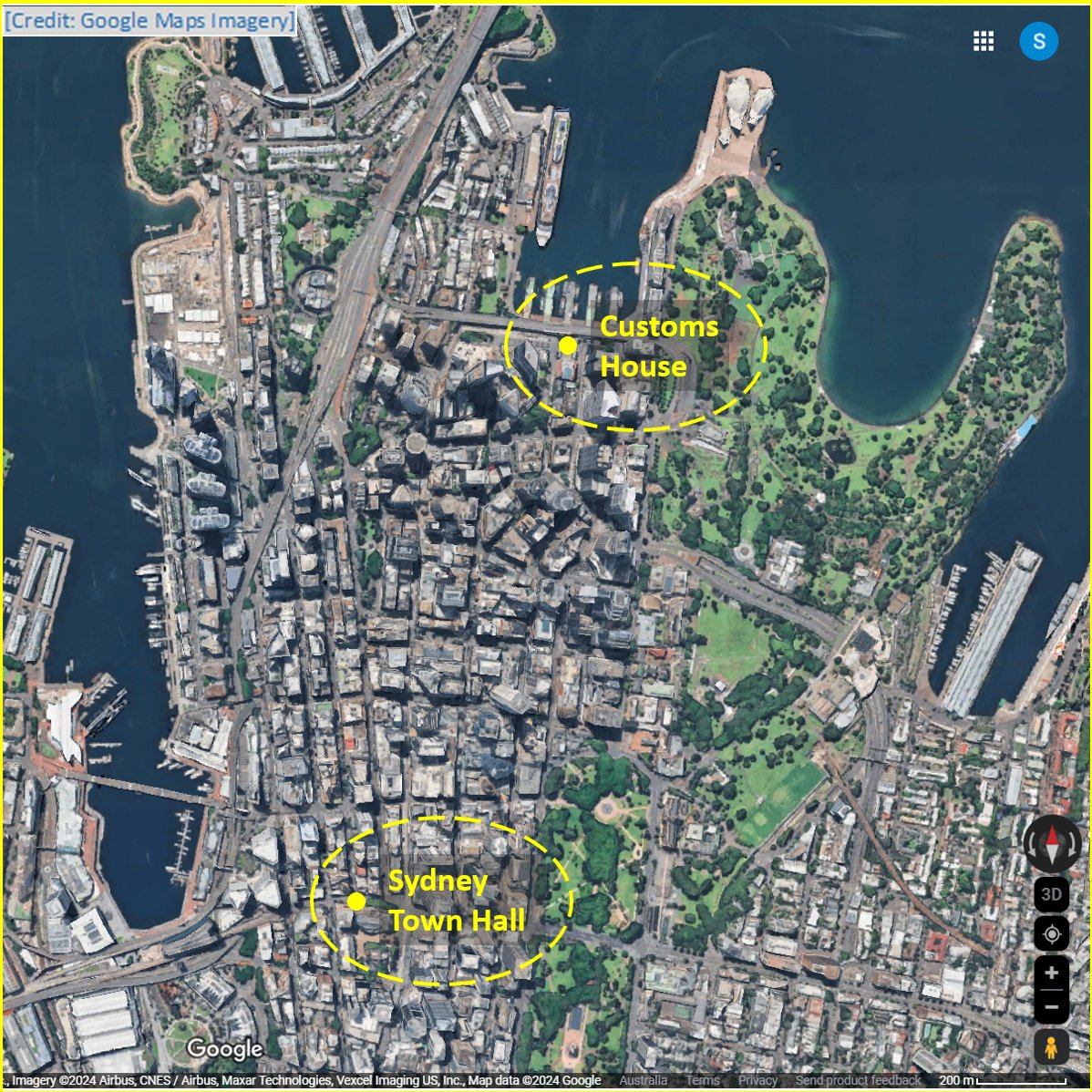
Getting there:
Ferry, train, bus and light rail all head towards Circular Quay, where the Customhouse can be found behind the train station
For public transport, use the
https://transportnsw.info/trip#/trip
Level access outside; a ramp with handrails provides an alternative to the three steps at the front entrance
https://www.cityofsydney.nsw.gov.au/landmarks/customs-house
https://www.cityofsydney.nsw.gov.au/things-to-see-and-do/city-model
The
There’s More Than Fish at the Sydney Fish Market
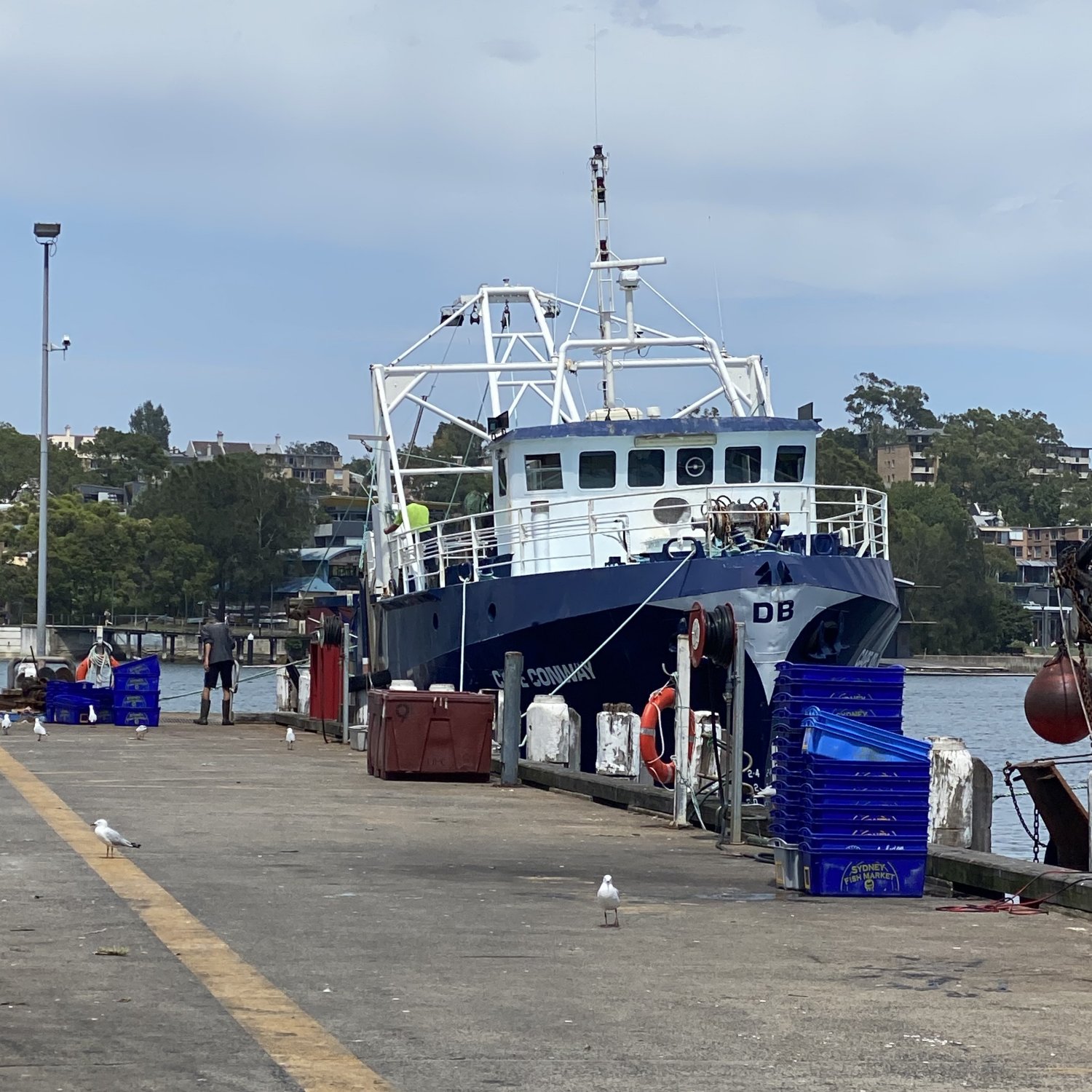
That’s right – there’s not only seafoods, but also a selection of meats, vegetables, sushi, breads, ice cream, and of course, coffee! So there’s no need to rush – rather, it’s a place to enjoy, at your leisure.
For lovers of good seafood, a visit to the historic Sydney Fish Markets should be high on the list of things to do when in Sydney. When it comes to fresh fish, where else would you want to go?
If you are after a ‘from the tank to the plate’ experience, you can choose a lobster, crab, abalone, or a fish, from the different retailers live tanks, and have it cooked in a style of your choosing!
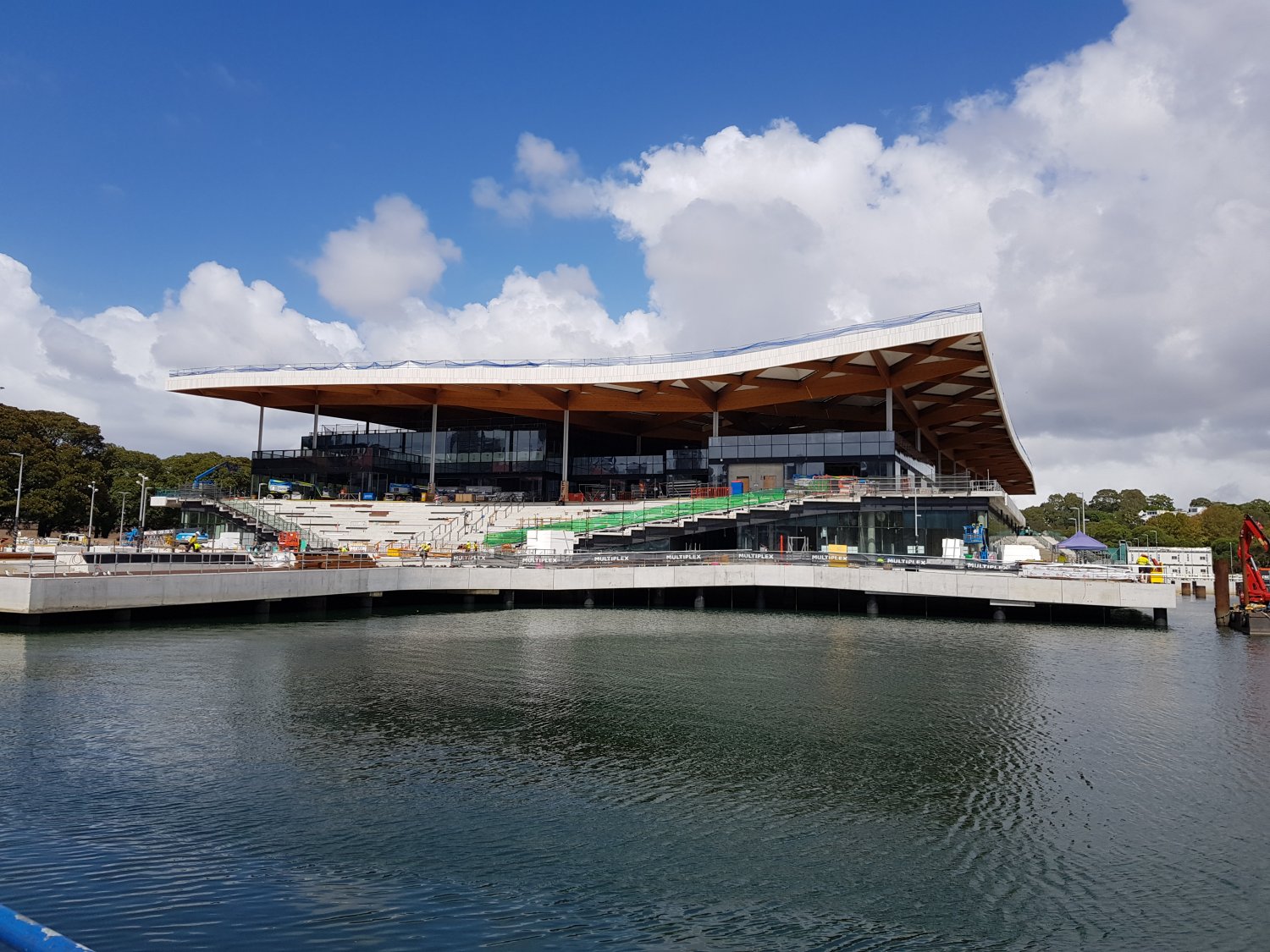
As one of the world’s largest fish markets, the Sydney Fish Market has a fleet of trawlers that catch fish along the NSW coast, between Wollongong and Newcastle.
Caught fresh in the waters of the Pacific Ocean/Tasman Sea, trawlers unload their prize at the Sydney Fish Market wharf, adjacent to the Market.
Sydney’s original Fish Market was established at Woolloomooloo, in 1871. In 1911, a new Municipal Fish Market was opened in Haymarket. The current Fish Market was relocated to its present site at Pyrmont’s Blackwattle Bay, in 1966.
The ‘new ’ Sydney Fish Market, being built next door to the current site, was due for completion in ‘late 2024’. However, after delays, the opening has been scheduled for January 19, 2026.
In the meantime, the current historic Market is still well worth a visit. Do take the opportunity to treat yourself to some of the freshest seafood that can be found everywhere!
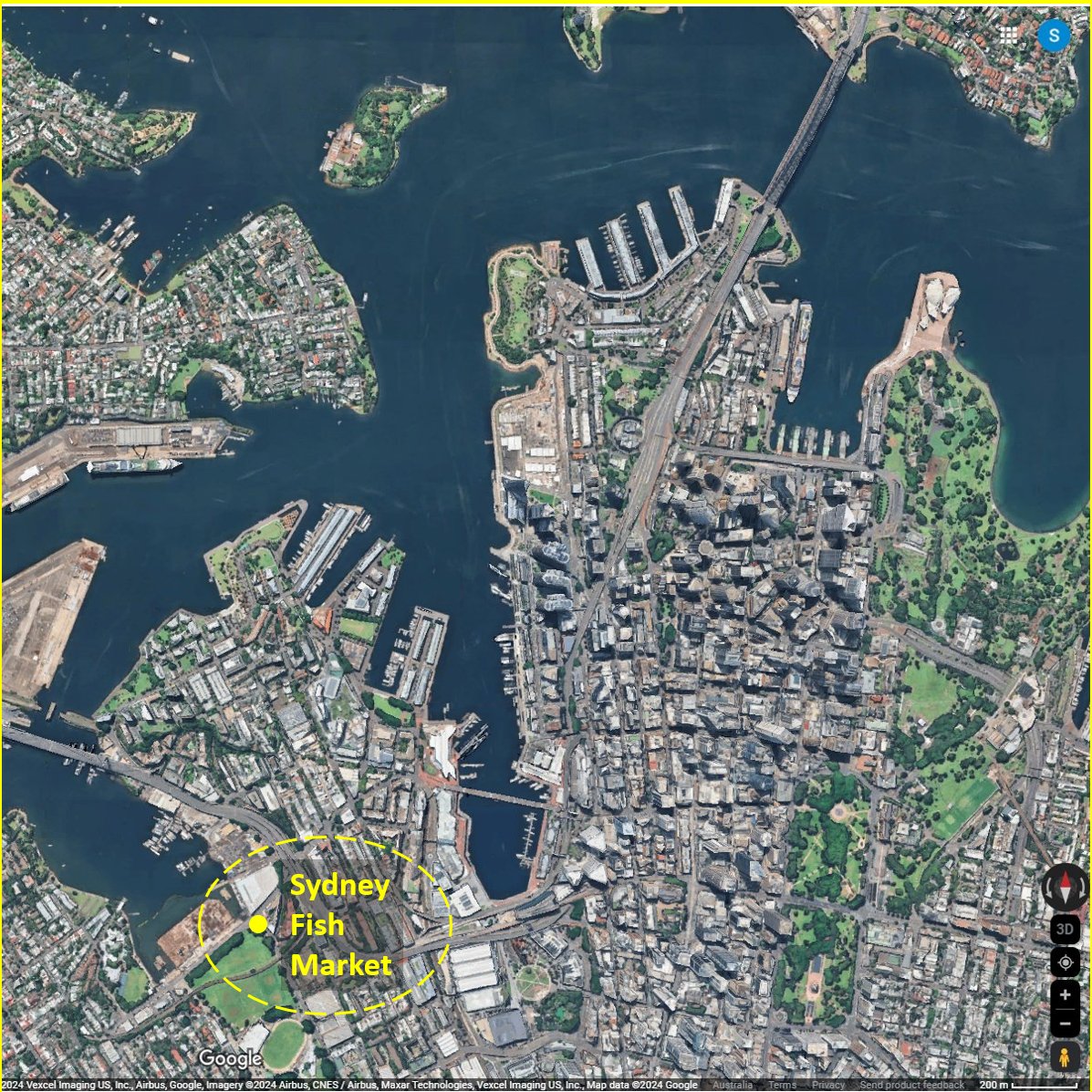
Getting there:
Light Rail Trams and City Buses run to the Fish Market Light Rail stop, Pyrmont
Take the L1 Light Rail towards Dulwich Hill (I caught it from Central Station), and alight at the Fish Market stop
For public transport, use the
https://transportnsw.info/trip#/trip
The market area is relatively flat, and there are minimal stairs
There are disabled parking spaces available
https://www.sydneyfishmarket.com.au
The
Step Inside the Splendour of Government House
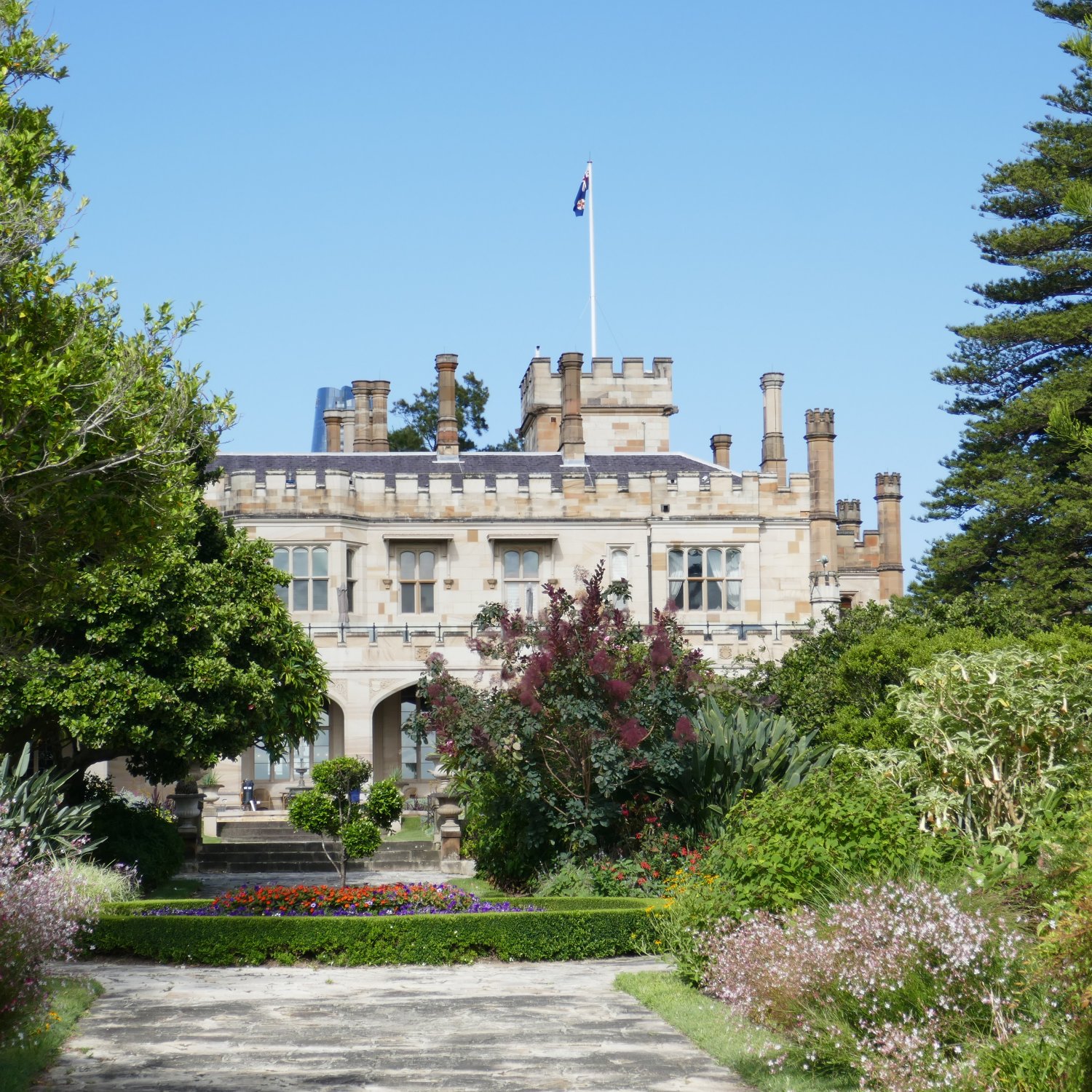
Sydney Government House is one of Australia’s most historic landmarks, where centuries of heritage meet stunning architectural beauty, and meticulously maintained gardens.
The first Governor lived in a house made of canvas. But soon, the new, two storey brick Government House dominated the foreshore of Sydney Cove.
From 1789 to 1845, nine successive Governors resided at the first Government house, which slowly became more and more dilapidated. In 1837, work began on a new Government House, overlooking the Harbour.
It was not until 1845 that the elaborate sandstone structure, in Gothic Revival style, became the home of Governor Sir George Gipps, and his wife, Elizabeth.
In 1996, pro-Republican State Premier Bob Carr announced that the incoming 36th State Governor would not reside at Government House. Supposedly this would generate yearly savings of about $2 million for taxpayers of New South Wales.
However, the next annual report by the NSW Auditor-General revealed the true outcome had been an increase in costs of $600,000. The State Governor did not return to reside in Government House until a change of Government, in 2011.
(I do wonder whether the “Honorable” Mr Carr ever considered compensating the NSW taxpayers for his rather expensive ‘stuff up’ ?)
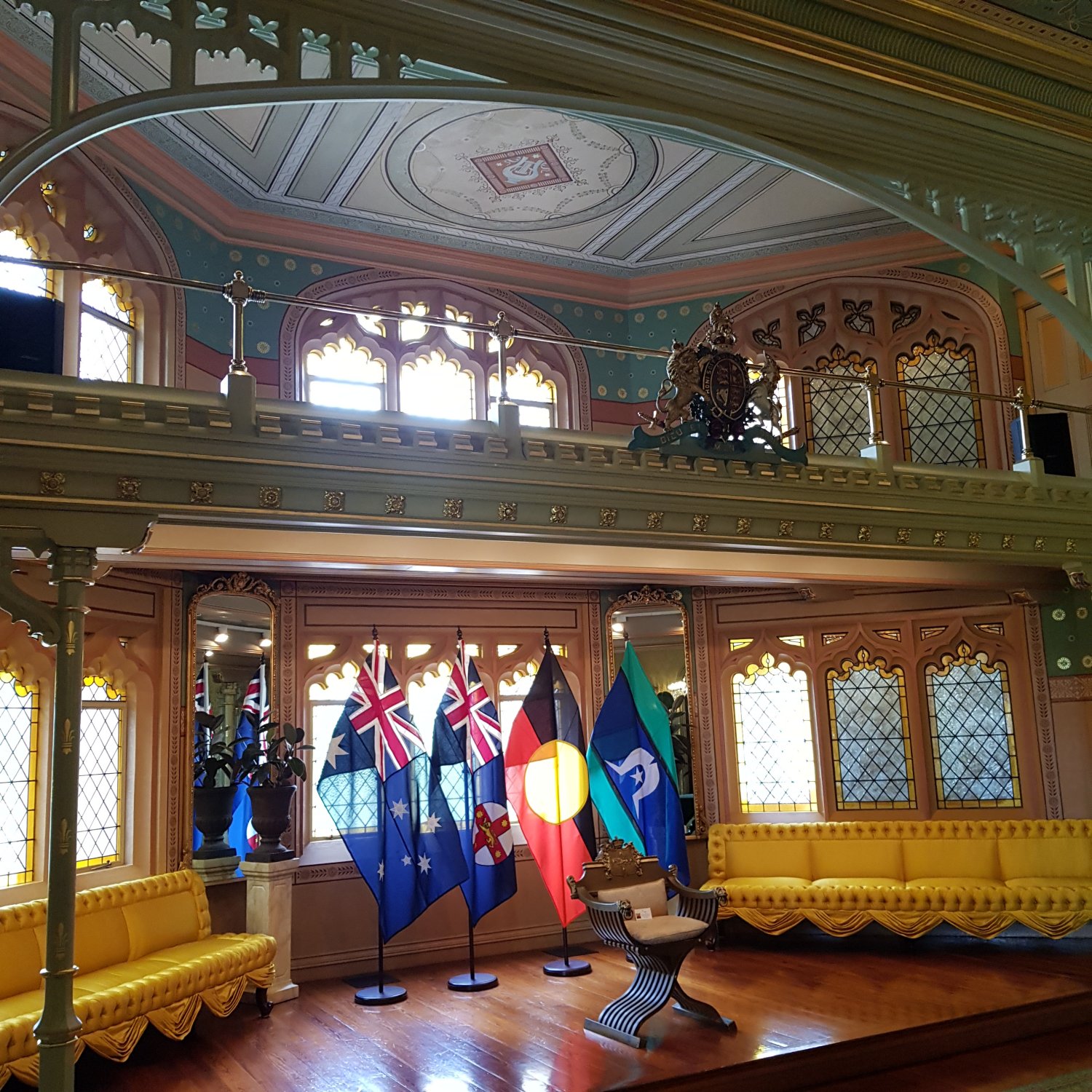
Today, Government House offers FREE guided tours, which allow visitors to experience the grandeur of this historic residence at no cost. Checkout the link below for details, as Tour schedules may be varied to accommodate official Vice-Regal functions.
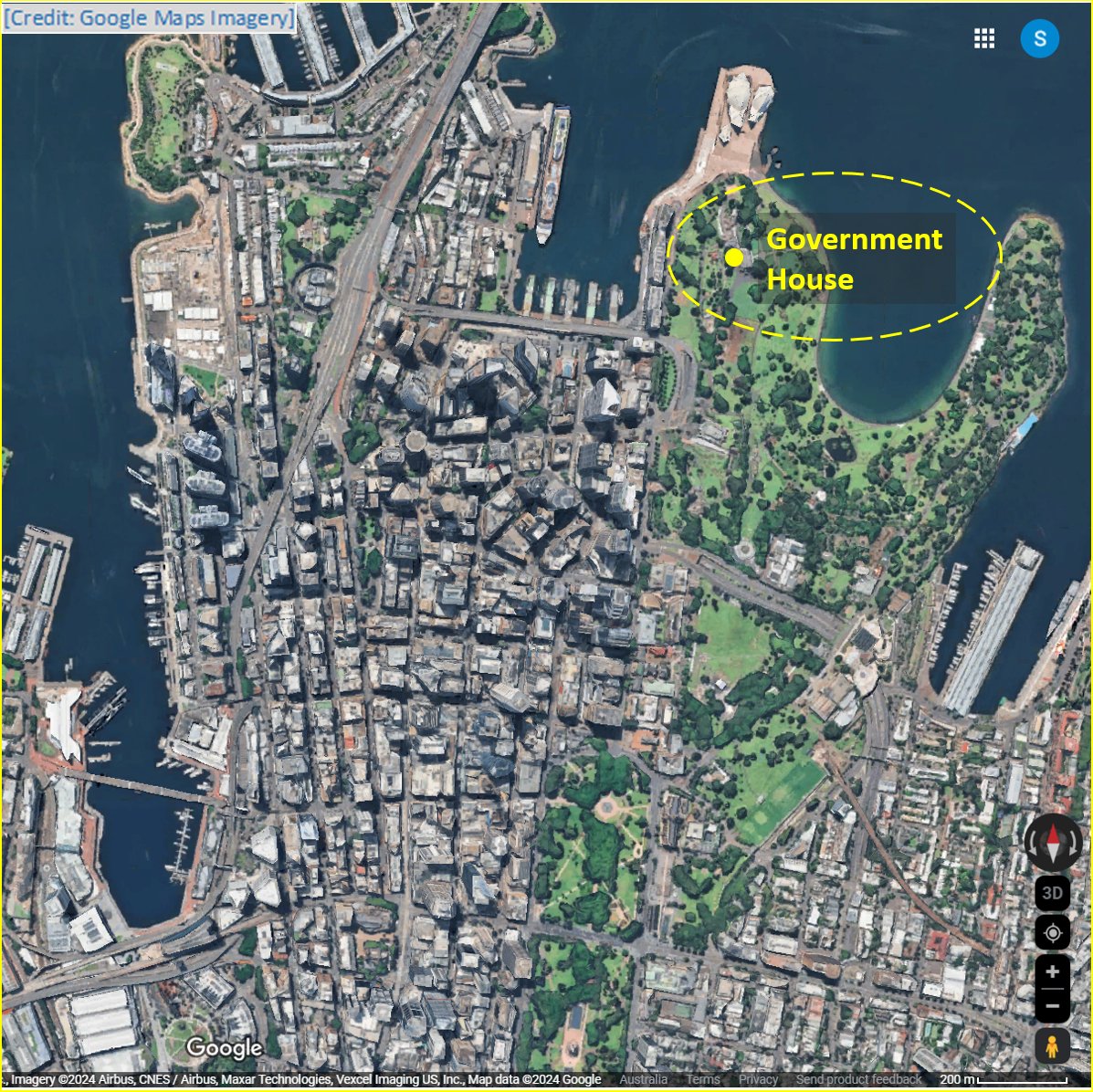
Be aware, for security purposes:
- All visitors must register at the Ticket Office by the main gate
- Valid ID is required
- Tour groups are limited to 20 visitors
- Tour spots are allocated on a first-come, first-served basis
Getting there:
A 10-minute walk from Circular Quay. Sydney Government House is located inside the Royal Botanic Gardens. The nearest gate is on Macquarie Street
For public transport, use the
https://transportnsw.info/trip#/trip
There are a couple of steps leading into Government House Sydney; elsewhere there are some steps and ramps with hand rails from the State Rooms to the Arcade and Eastern Terrace Garden
https://www.governor.nsw.gov.au/government-house/visit-us/
https://www.governor.nsw.gov.au/government-house/virtual-tour/
https://tour.governor.nsw.gov.au/
Explore these Grand Stables, and Enjoy the Talent
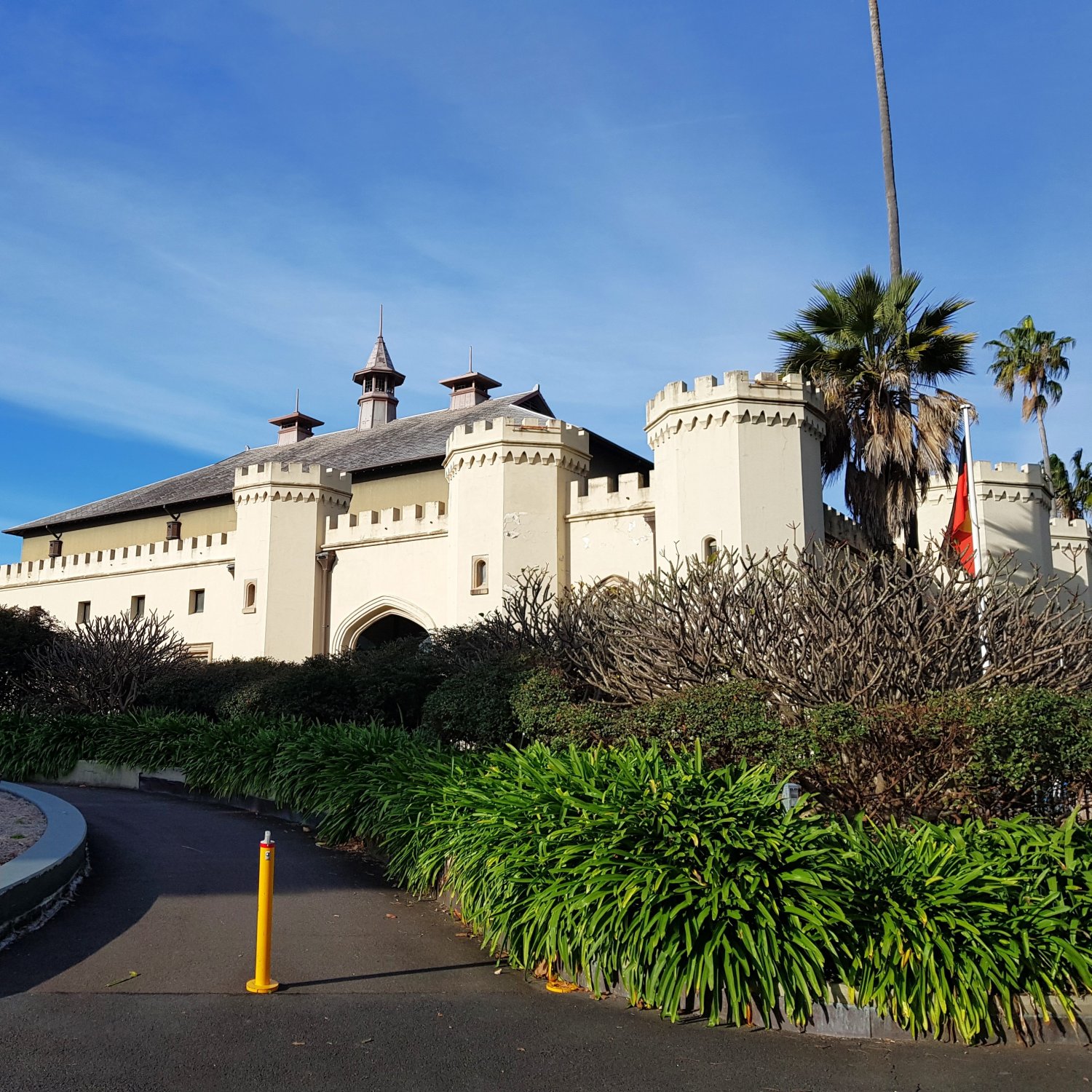
Be sure to visit the grandest horse stables outside of Europe. And, if you get the date and timing right, you could catch a free, one-hour public concert, by some of the Rising Stars of the Sydney Conservatorium of Music.
The grand, castellated Government House Stables were commissioned by Governor Macquarie, in 1817. Intended as companions for the future government house, these ‘grand stables’, were designed by the then Acting Civil Architect, Francis Greenway.
Supposedly, the inspiration for the design of the Government House Stables was the medieval Thornbury Castle, in Gloucester, UK, which was about 20km (12 miles) north of Greenway’s native Bristol. Some suggest the design was also influenced by Inveraray Castle, in Argyll, western Scotland.
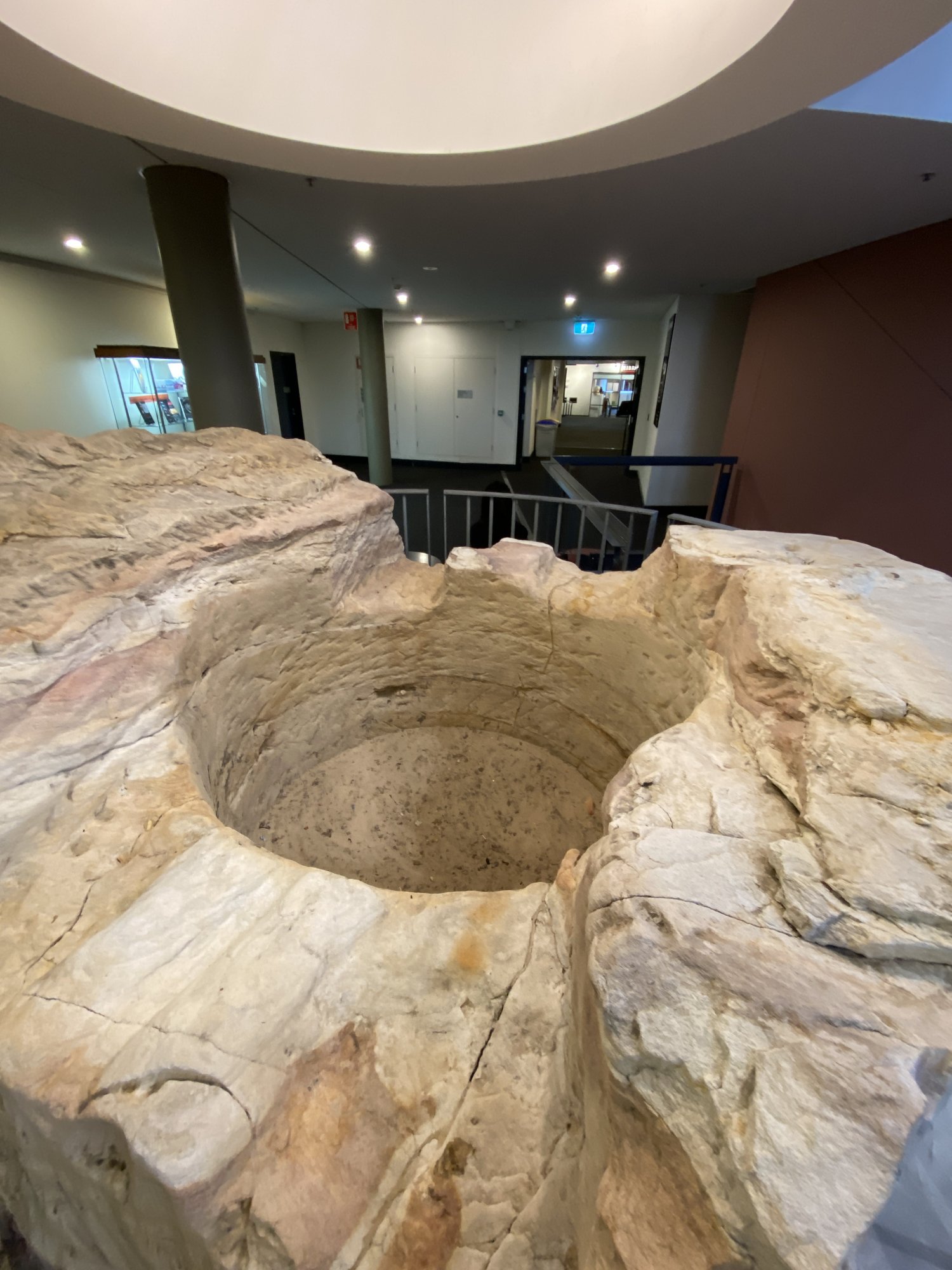
The grandeur of the stables was condemned by Governor Macquarie’s detractors as being too costly and self-indulgent. A report by Commissioner Bigge, who had been sent by the Colonial Office to investigate the colony’s effectiveness, described it as a building of ‘useless magnificence’.
Almost 100 years after Governor Macquarie’s initial direction, in 1915 the Government House Stables building became the NSW State Conservatorium of Music. In 1998, redevelopment of the site was begun with an archaeological excavation.
This revealed numerous artefacts, many of which are now on permanent display in the foyer. These include the remains of an old well, from the original Stables.
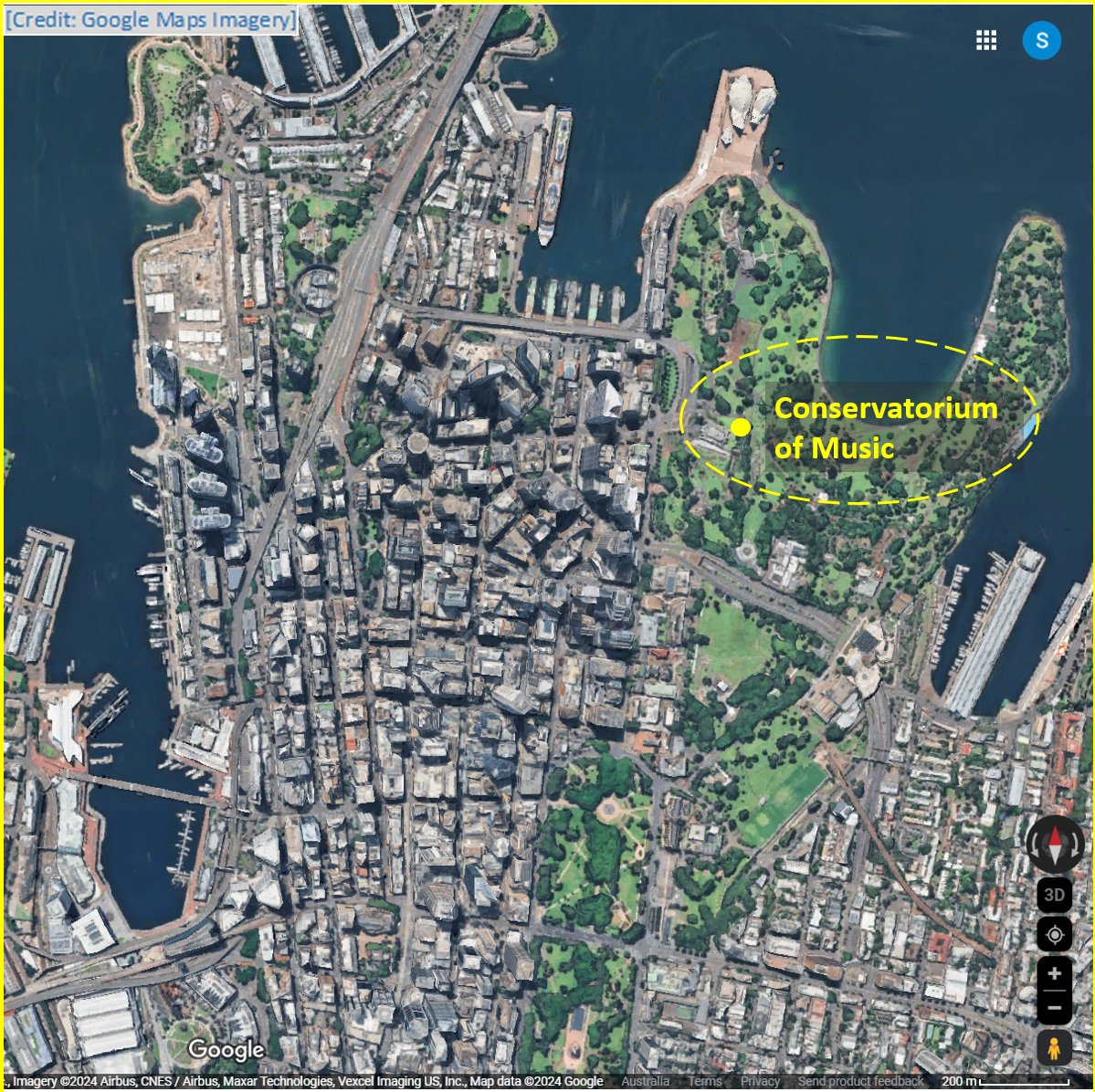
Getting there:
A 10-minute walk from Circular Quay
For public transport, use the
https://transportnsw.info/trip#/trip
There are stairs and lifts inside the building
Walking from Circular Quay involves +40 steps up to Macquarie Street
The Rising Stars Concert program:
https://openacademy.sydney.edu.au/rsdates
The
In the CBD, And NEED to PEE? Here’s Where to Go!
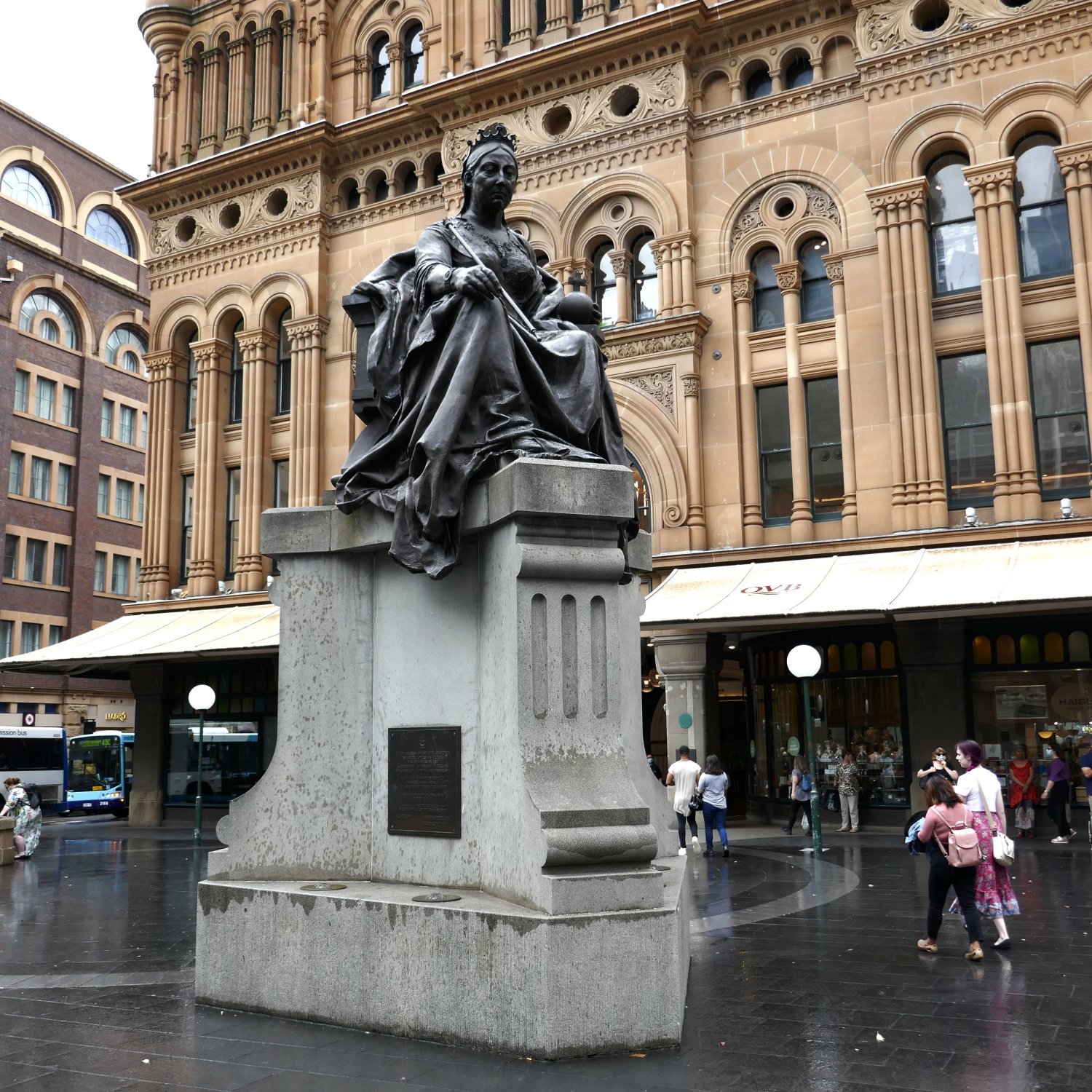
Let’s not mess about here! If you need to “GO”, head straight to QVB: that’s the Queen Victoria Building, on George Street.
Sydney’s George Street is also ‘The High Street’ of Sydney, and between QVB and Wynyard Station, you will find some of Sydney’s best shopping.
Queen Victoria Building is a grand old lady, with amazing internal features, from its tessellated floors, stained glass windows, and rounded arches, to a spiral staircase going absolutely nowhere, and the beautiful domed ceiling.
And here, my ‘Friend in Need’, you can step back in time, to an era when public toilets were not only functional, but also very elegant!
Oh, the relief!
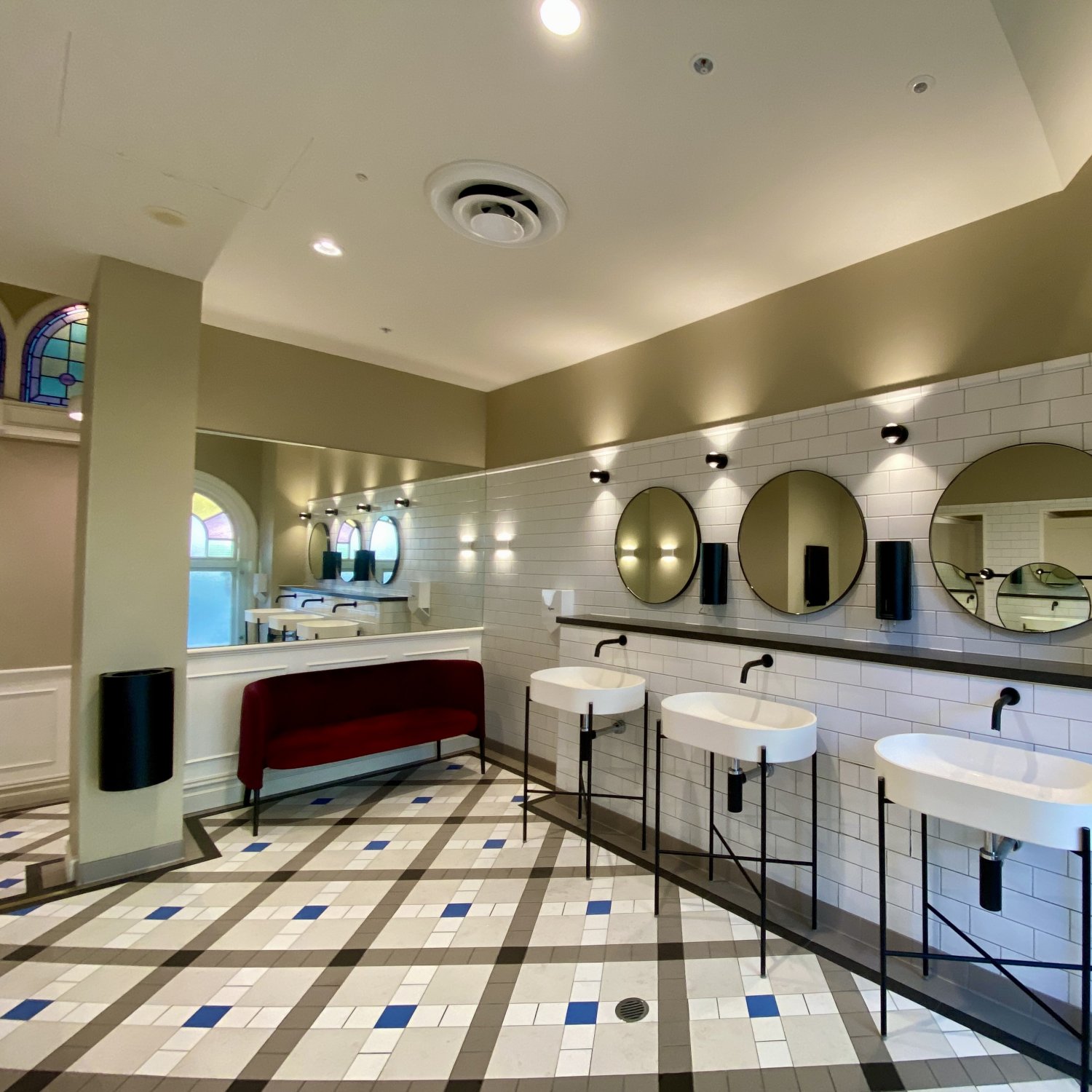
For sure, QVB’s architecture is without a doubt amongst the most impressive in the CBD. But, oh my goodness, the grand old lady’s Art Deco public restrooms are an absolute “must-see” (and try)!
There are two wonderfully elegant Ladies’ Powder Rooms (aka Restrooms); one on level 2, the other on level 3 (both at the northern/Market Street end). For the Gent’s, there’s a men’s restroom on the 2nd floor (also northern/Market Street end) that is equally as impressive!
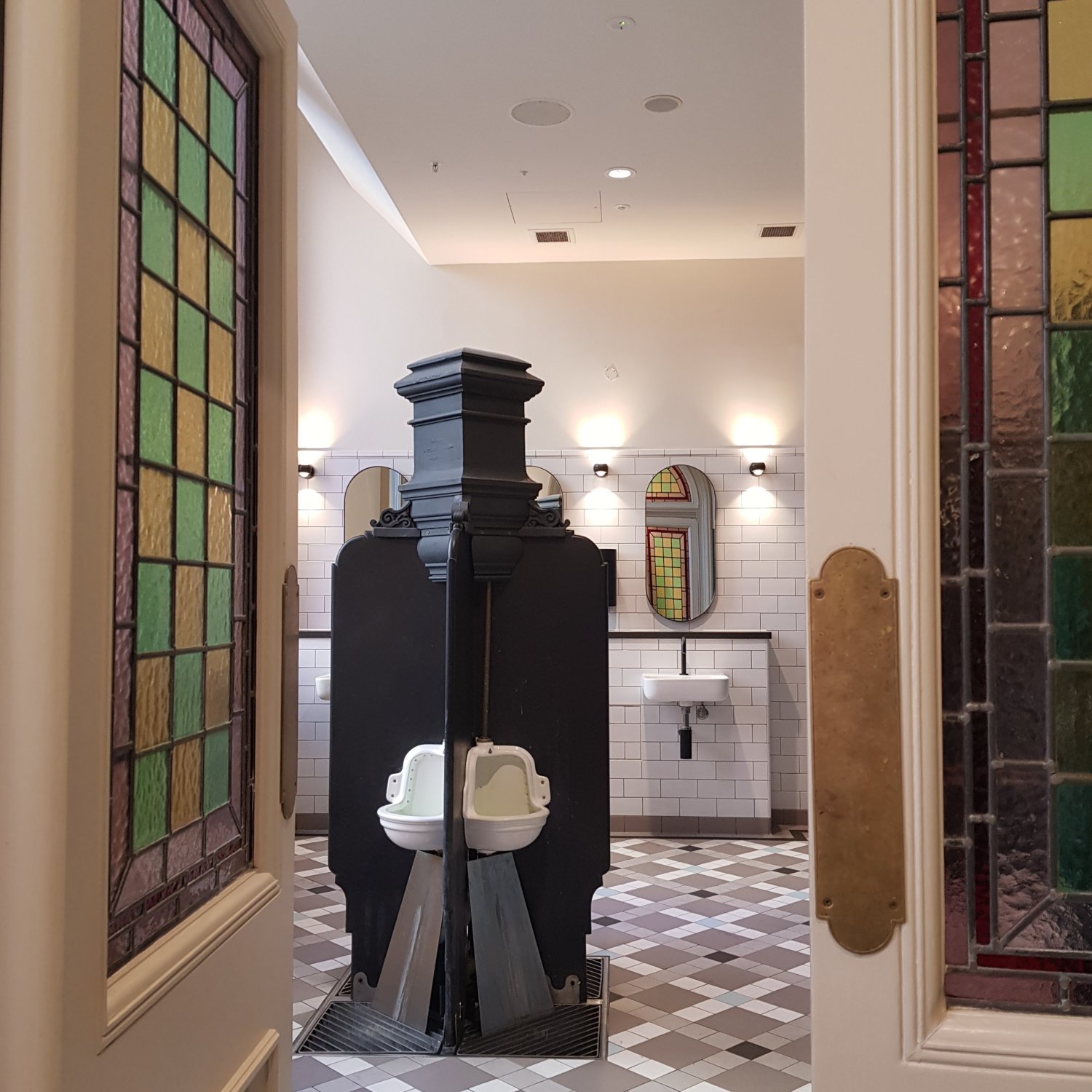
So then, even if you don’t ‘need to go’, QVB’s heritage-era dunnies are definitely ‘worth a GO’!
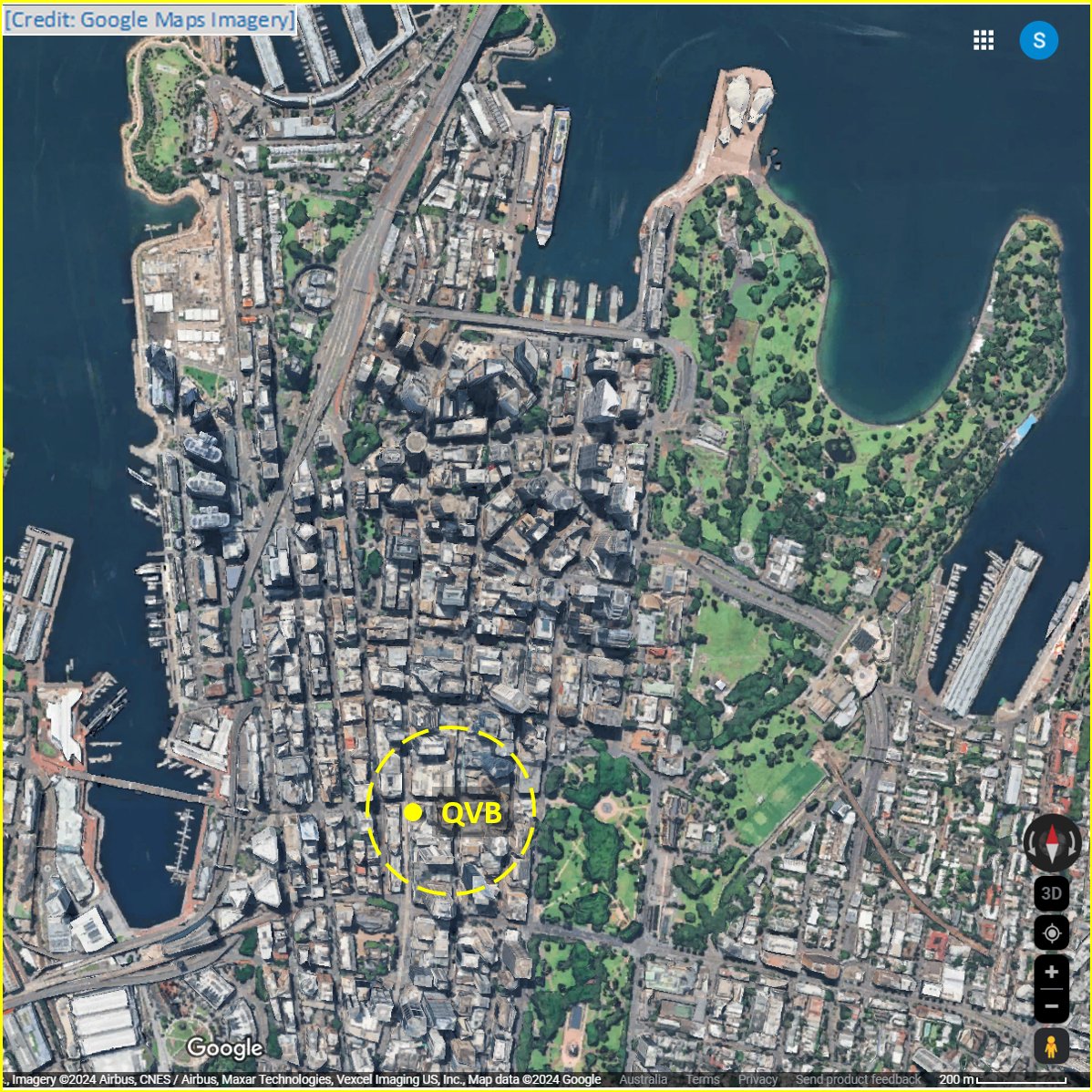
Getting there:
Catch the tram down George Street, or the train and alight from a train at Town Hall, and take a very short walk
For public transport, use the
https://transportnsw.info/trip#/trip
QVB has several lifts and escalators
And if you do get ‘caught short’ somewhere else in the City (or anywhere in Australia, actually), use the National Public Toilet Map to find a solution:
The
Turn the Clock Back for Life in Sydney in 1844
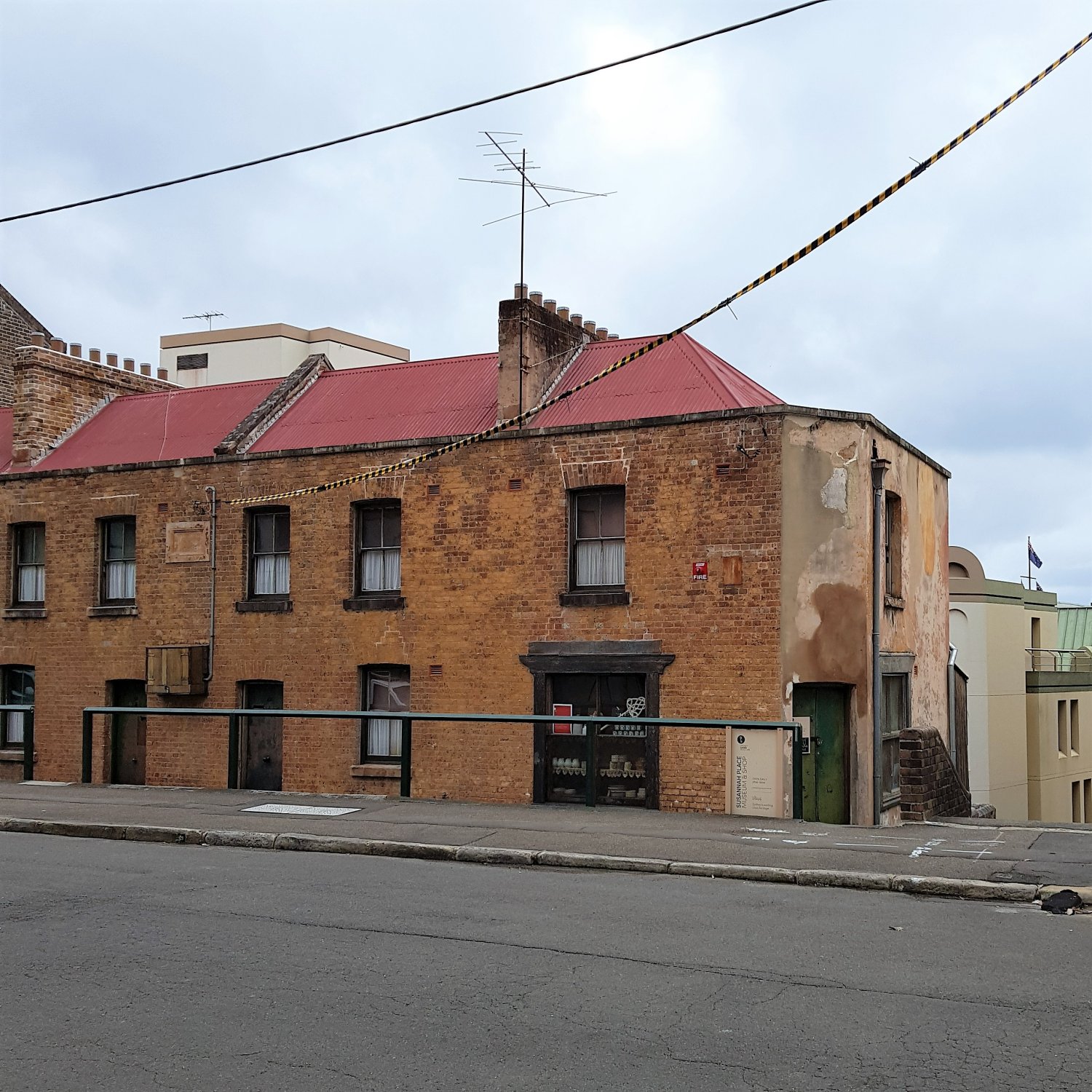
It seems that 1844 was not a particularly auspicious year in most parts of the world – no dramatic global-scale events, such as eruptions, earthquakes, or wars.
In Sydney, however, two standouts for 1844 were: (1) the Hero of Waterloo Pub was opened, at Miller’s Point, and (2) an Irish immigrant, named Edward Riley, built a block of four terrace houses on Gloucester Street, at The Rocks, for £450.
The former is important because the Hero of Waterloo still stands today, in its original skin. The latter is important because Edward Riley’s story is an enigma.
With his wife, Mary, he migrated from Ireland in 1838, as a farm labourer. Six years later, while Sydney was in the middle of an economic depression, he apparently paid cash for the property where he built the terrace houses.
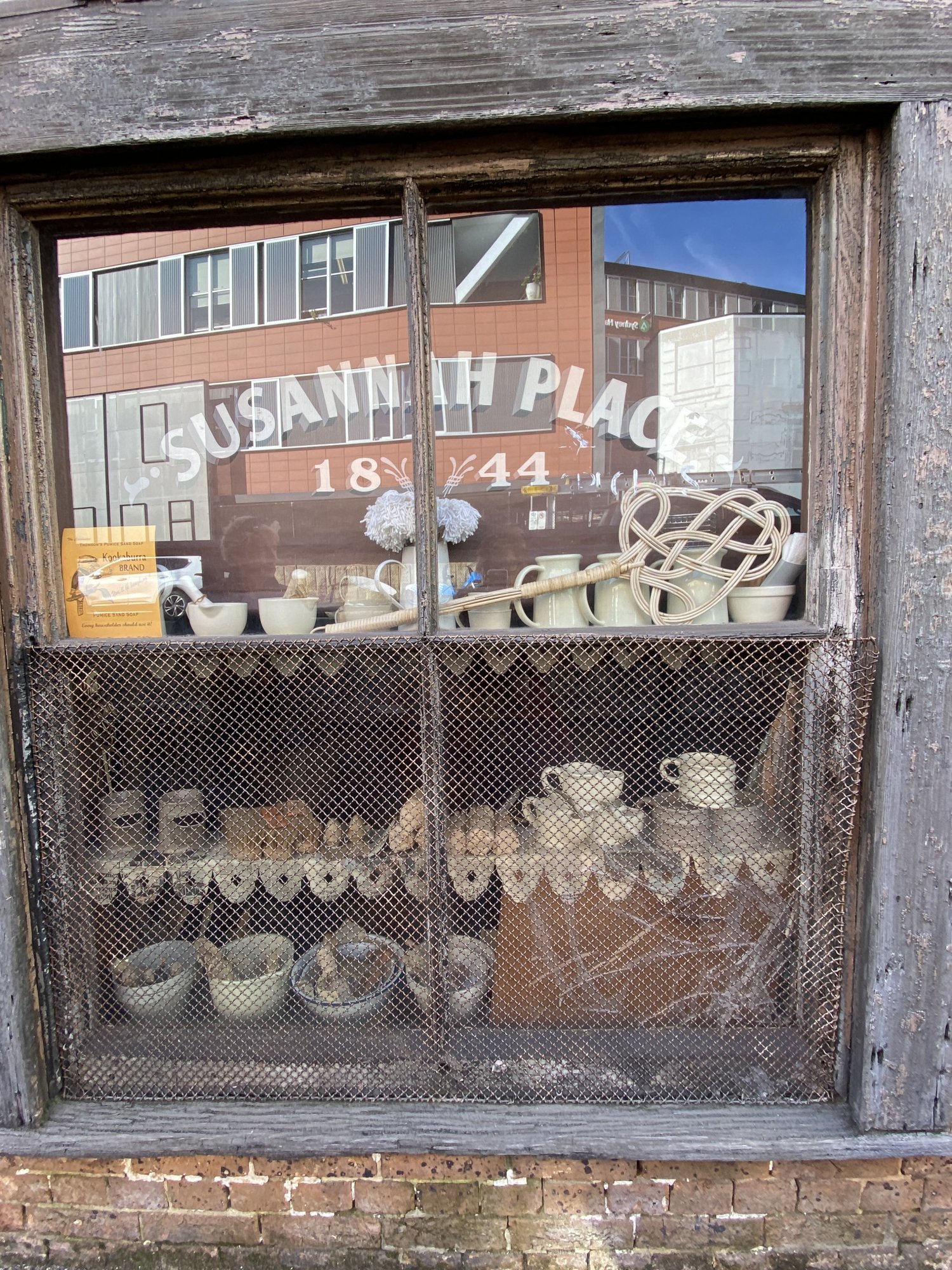
When I visited, I was told that photography is not allowed in the museum – today the website does NOT mention this
Where, or how, did a farm labourer come by a significant amount of cash, in the middle of an economic depression? History apparently has left us no clues about that. Note: Riley’s £450 from 1844 would be worth more than $AUD 82,500 in 2024.
The modest interiors and rear back-yards of Edward Riley’s terrace houses have remained relativity unchanged ever since, and they illustrate the restrictions of nineteenth-century inner-city life at The Rocks.
Today, Edward Riley’s four tiny terrace houses are the Susannah Place Museum, and are operated as a living time-capsule by the Museums of History, NSW. Access to the Museum is by guided tour only.
The knowledgeable guides will tell you stories of the people who called this place home, including why it is called Susannah Place.
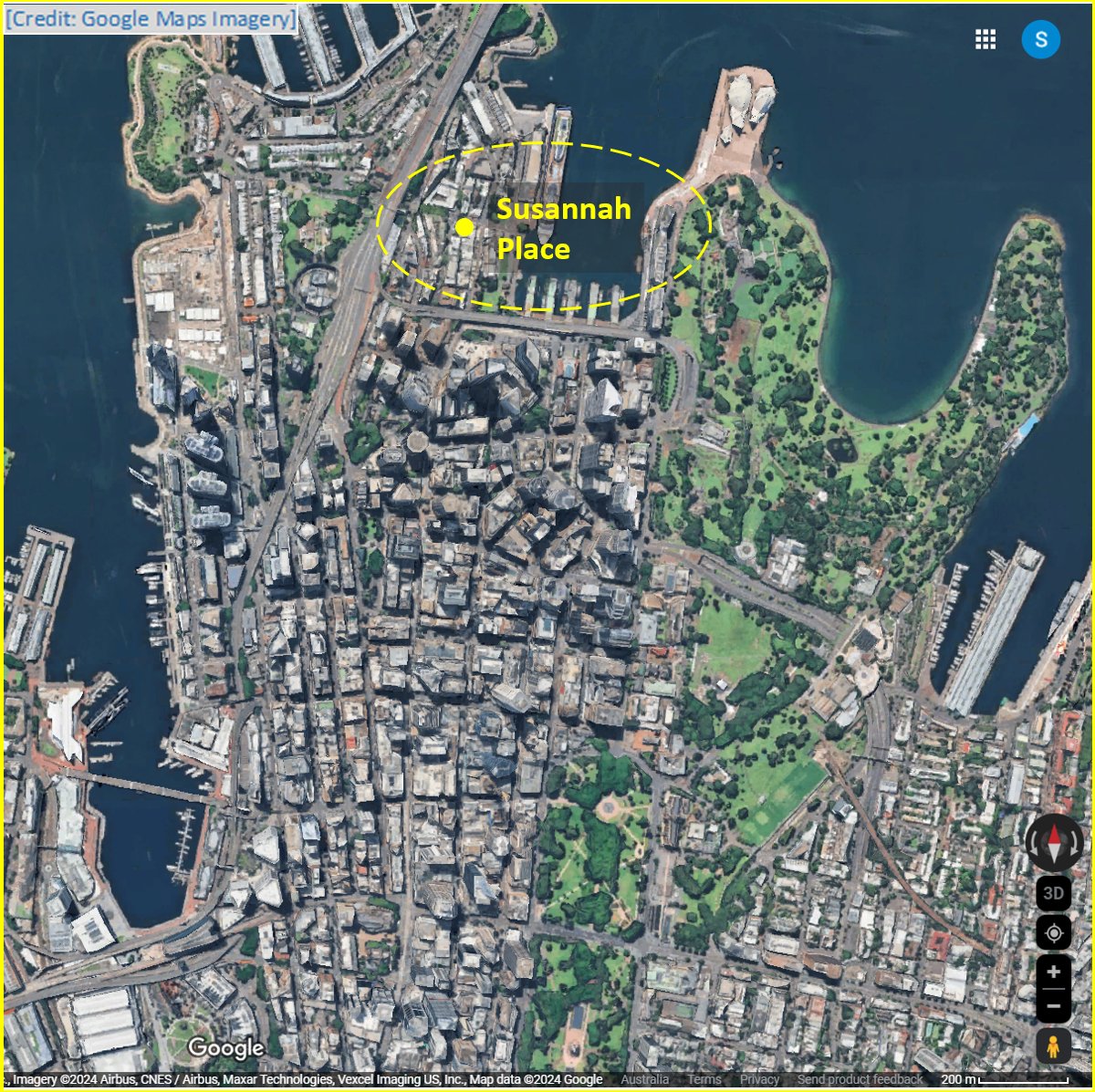
Getting there:
Susannah Place is at The Rocks, a short (but uphill) walk from Circular Quay
For public transport, use the
https://transportnsw.info/trip#/trip
Entry is FREE, however online bookings are required for museum tours
Unfortunately, Susannah Place is not suitable for people with limited mobility as there are several internal and external stairs
https://mhnsw.au/visit-us/susannah-place/plan-your-visit/
https://mhnsw.au/stories/museum-stories/two-up-two-down/
A 6-minute video, offering a peek into one of the terrace houses, with a 2017 interview of the Susannah Place Curator, Ann Cossu:
Take a Nature Ramble Beside Sydney’s CBD
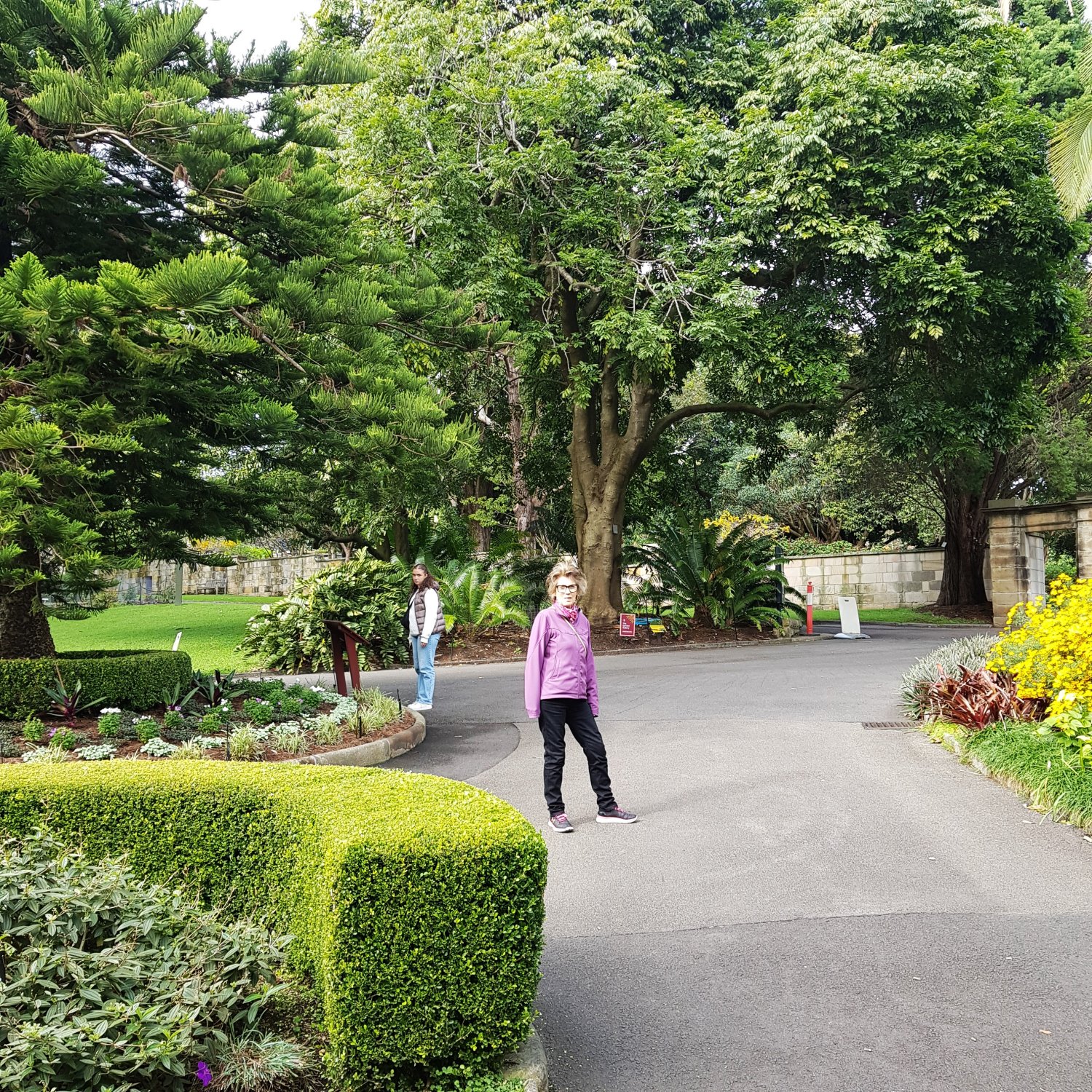
One of the sparkling jewels in Sydney’s Crown (as The Gateway to Australia) must be its Royal Botanic Gardens.
To know more about Australian ‘Bush Tucker’, or exotic Australian plants, this is the place to go. If you want to catch a bit of peace and tranquillity, alongside the hustle and bustle of the busy City, this is also the place to go.
If the weather is fine and you have the time, why not have a picnic in the garden along the shoreline of Farm Cove, or even continue all the way along to Mrs Macquarie’s Chair, on the other side of the Yurong Gate.
Throughout year the Royal Botanic Gardens hosts a number of Guided Walks, ranging from Behind the Scenes in the Glasshouse, to Aboriginal Bush Tucker and Aboriginal Harbour Heritage Tour.
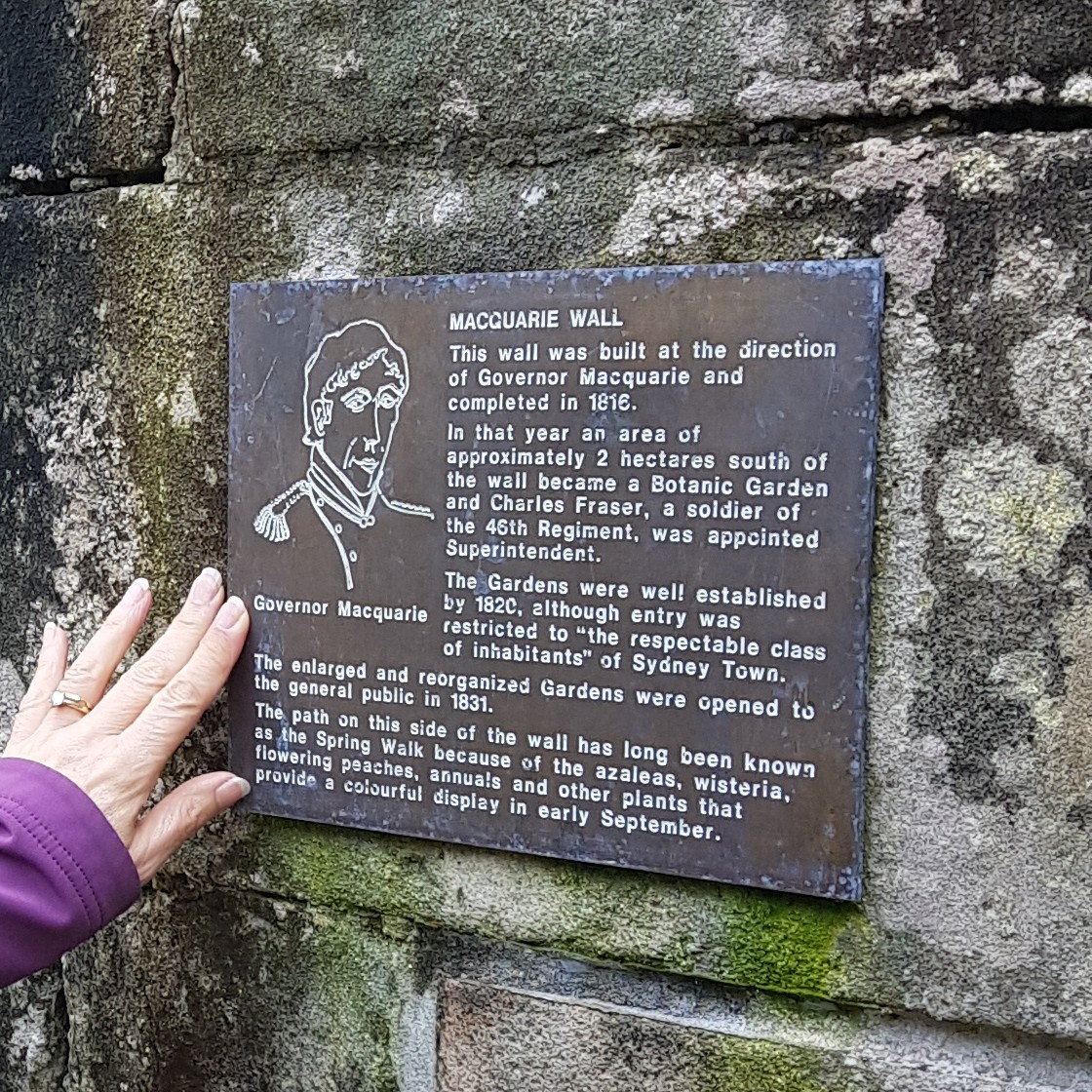
These guided walks are conducted by knowledgeable volunteers. Commencing at 10:30am, from the Garden Shop Visitor Centre within the Royal Botanic Garden Sydney.
While this is a ‘free’ service, a donation is requested.
Only 15 places are available on each walk, therefore online bookings are required.
Walks are not conducted on days when temperatures are forecasted to exceed 35°C (95°F), or when extreme weather events are forecasted.
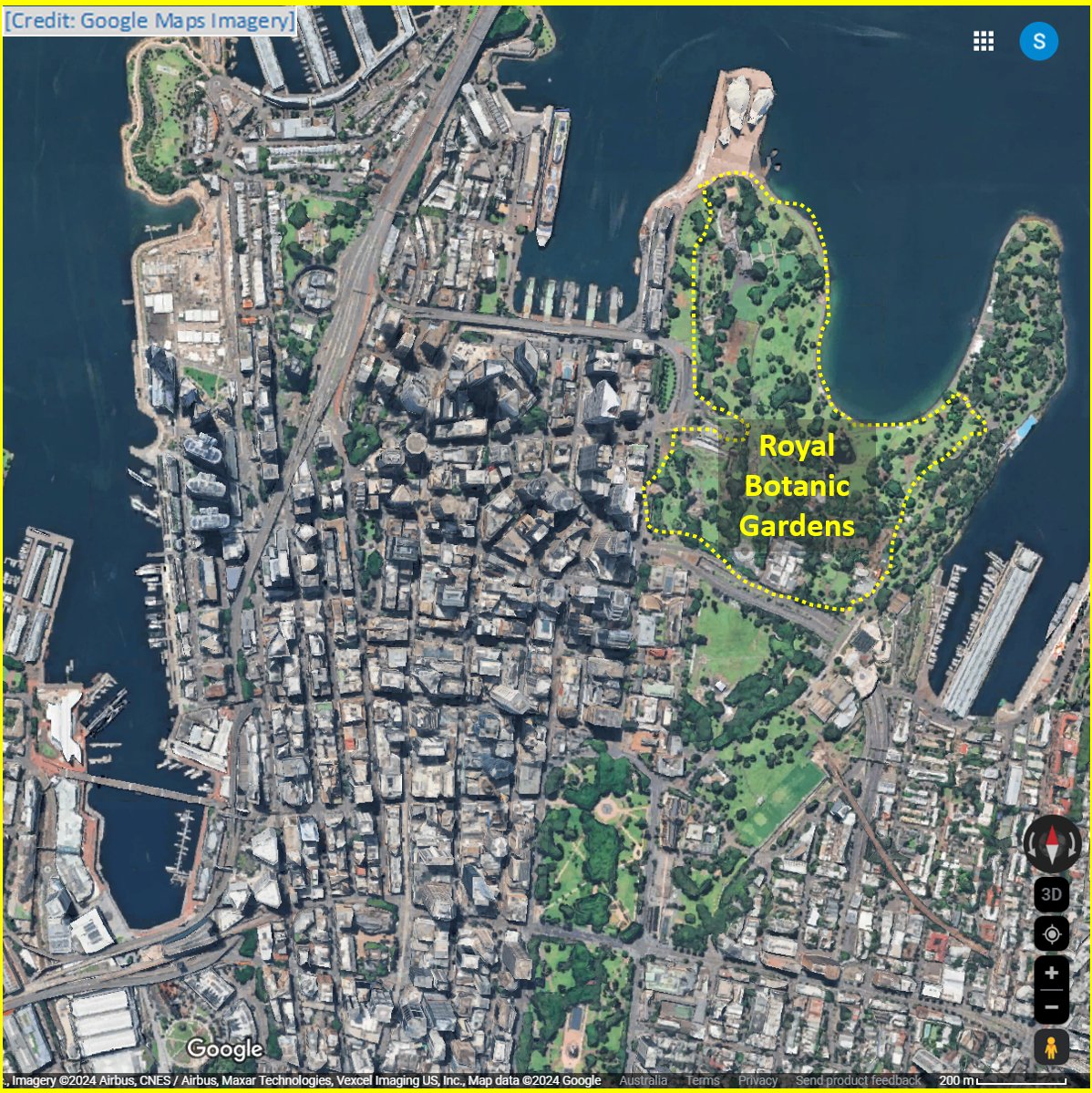
Getting there:
Opening hours vary throughout the year; use the links below to plan your visit
The Gardens are a 10-15 minute walk from train stations at: St James, Martin Place or Circular Quay; Entry is FREE
The are multiple entrance Gates for the Gardens; 3 near the Opera House; 5 along Macquarie Street; one opposite the Art Gallery of NSW; another 2 along Mrs Macquarie’s Road, and one on the foreshore pathway from Mrs Macquarie’s Chair
For public transport, use the
https://transportnsw.info/trip#/trip
Paths in the Gardens do include some uneven surfaces with gentle inclines, and steps
A useful downloadable PDF map of the Gardens shows accessible paths, along with Gates and other important/useful points (including Bus Stops)
https://www.botanicgardens.org.au/royal-botanic-garden-sydney/plan-your-visit
https://www.botanicgardens.org.au/whats-on/guided-walks
the
A Selfie with the Coathanger, or the Sails (or Why Not Both?)
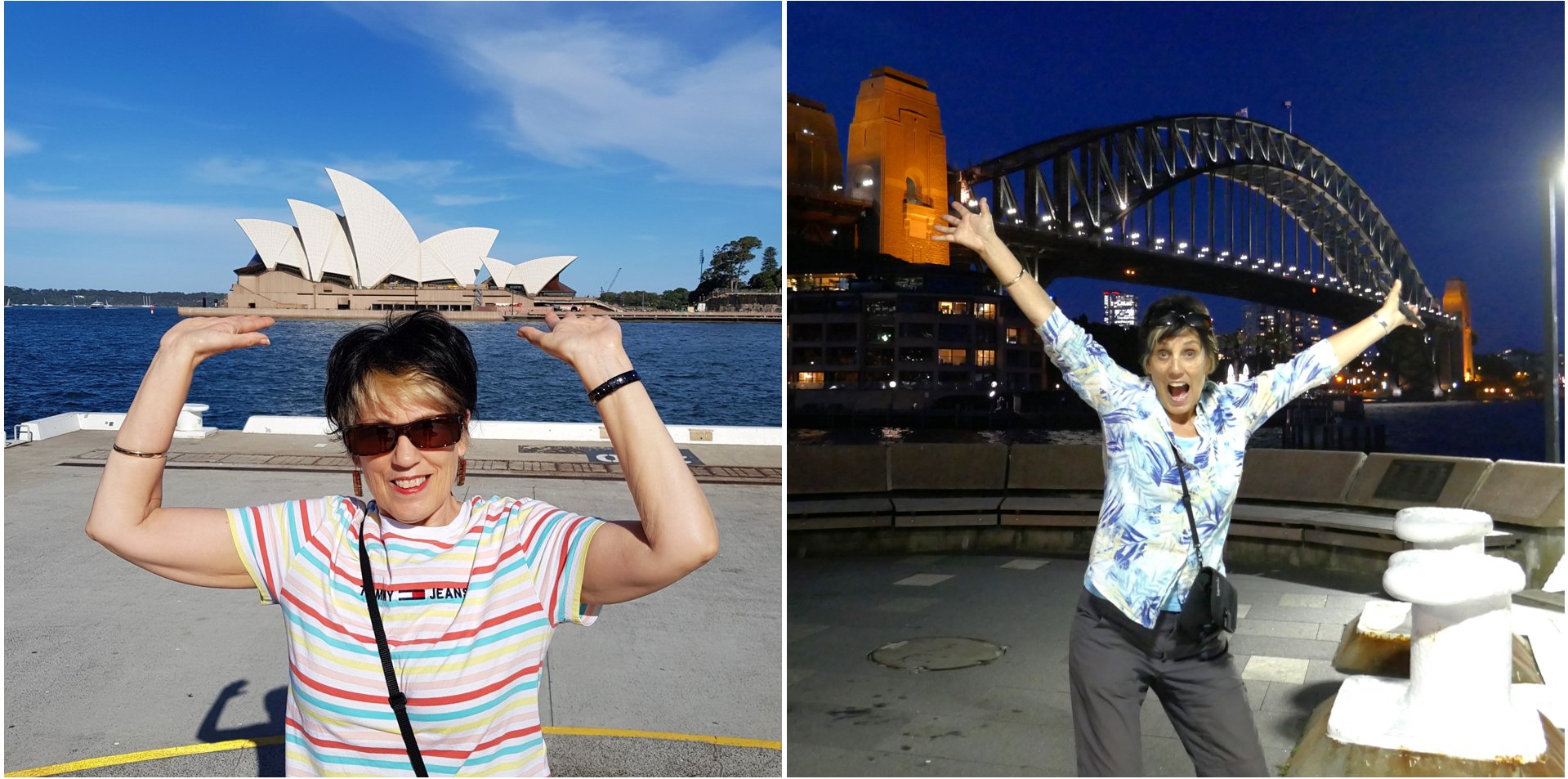
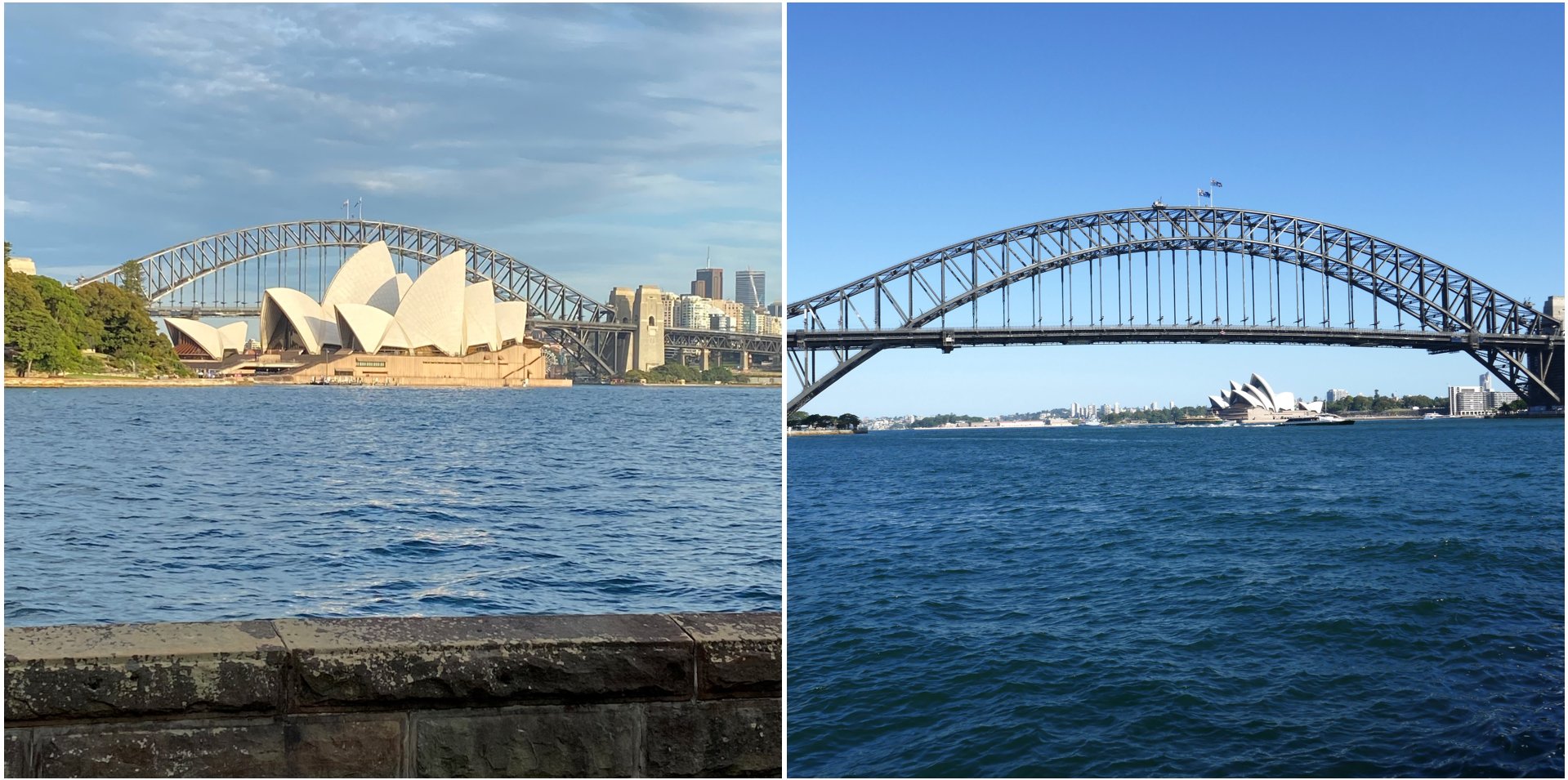
Two of Australia’s most well-known icons, the ‘Coathanger’ (i.e. Harbour Bridge), and the ‘Sails’ (i.e. Opera House), sit within less than 500 meters (⅓mile) of each other.
The best ‘quick’ option for snapping a selfie with each of these is from the end of the west (Harbour Bridge) side of Circular Quay, next to Campbell’s Cove. For a little bit more effort, the Rotunda Observation Deck at the Oversea Passenger Terminal (OTP) is also an option (you may need outdoor lighting to overcome shadows).
That said, on one of Sydney’s sunny days, getting a good selfie with each can be a matter of getting the right angle of the sun, which comes down to time of day.
There is another wildcard to consider, however. When a cruise liner is present at the OTP, it is likely that its stern will block any view of the Sails from next to Campbell’s Cove (that is, unless you are on that cruise liner, in which case your ship is your platform).
As both the Coathanger and the Sails are illuminated at night, an evening shot (after any cruise ships have departed) may be an option. Be aware that for up to 44 nights each year, the Sails may be illuminated with a light show.
For a more creative shot, with both the Sails and the Coathanger in the shot, your options are:
- make your way around the foreshore of the Royal Botanic Gardens for about 1¾ km (1 mile) to the Yurong Gate; about 50 meters beyond the Gate, the Opera House will be framed by the Harbour Bridge; or
- take a Circular Quay – Darling Harbour Ferry to McMahon’s Point (2nd stop); from the Ferry Wharf, the Opera House will be framed by the Harbour Bridge. You will get a similar picture from the stern end of the Ferry during the latter part of the trip.
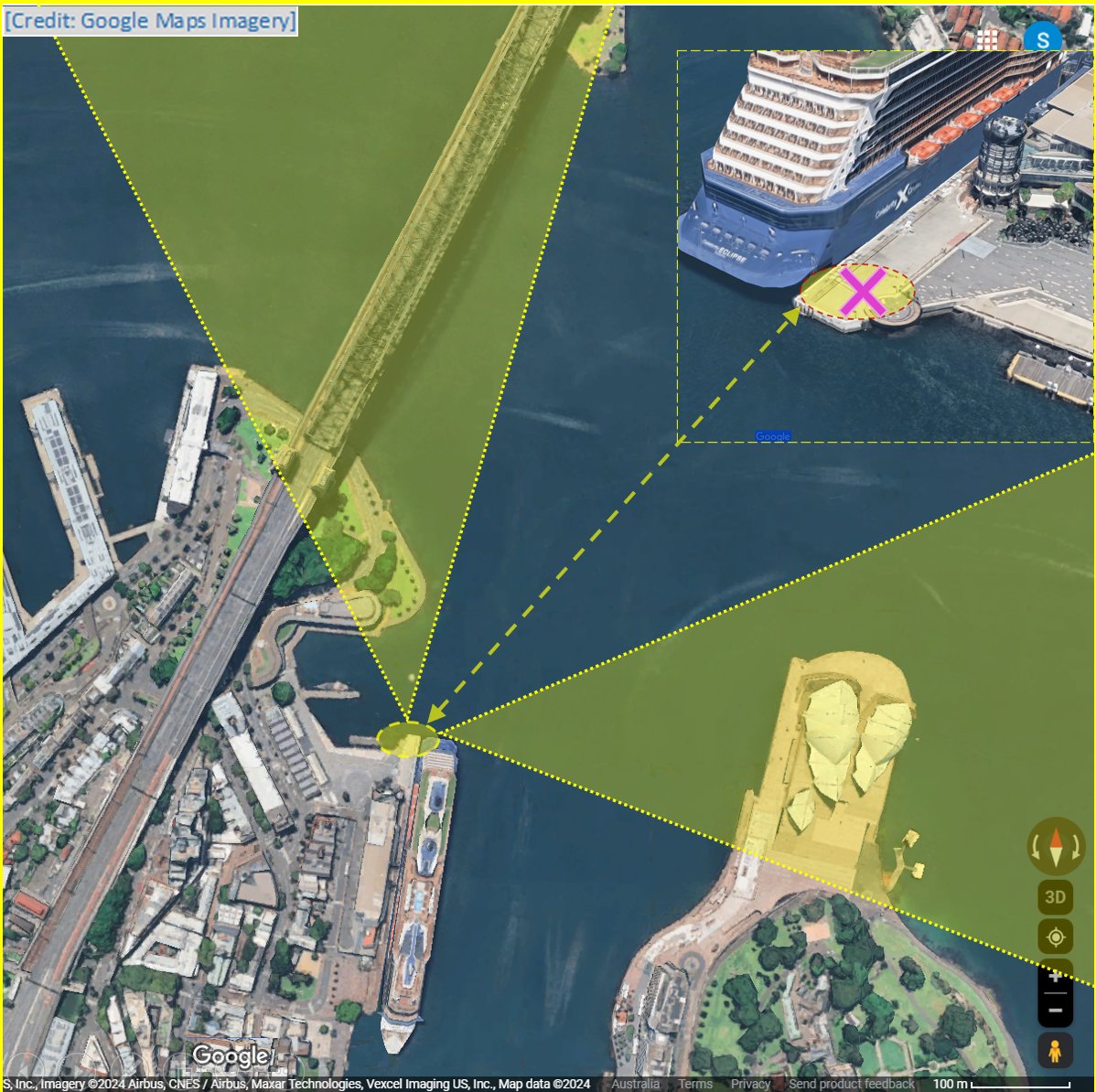
Getting there:
(1)
walk for around 700 meters (<½ mile) along the western side of Circular Quay towards the OTP, to the end of the Quay
(2)
walk along the eastern side of Circular Qual, going past the Opera House, and into the Royal Botanic Gardens;
continue along the foreshore of Farm Cove to the Yurong Gate
(3)
catch Darling Harbour Ferry at Circular Quay Wharf 5; catch a returning Ferry back to Circular Quay, or catch the next Ferry for a round trip via Darling Harbour
For public transport, use the
https://transportnsw.info/trip#/trip
All walking sections are relatively flat
Wrapping It Up…
My intention in writing this Post has been to demonstrate how Sydney offers a range of choices of year-round attractions, which appeal to all interests, and to all generations.
That said,
For more information about Sydney, do check out the afootwego.com Post: Your Very Comprehensive FAQ for Sydney, which offers answers to 50(+) questions that are frequently asked by visitors to Sydney.
Finally, one ‘gap’ that I am aware of, and which I WILL address in the near future, is “How to Spend a Rainy Day in Sydney”. And I will be sure include stuff for kids!
Useful Links:
For finding vehicle parking in Sydney, two online sites are:
Parkopedia (by the hour)
https://en.parkopedia.com.au/parking/sydney/
Parkhound (monthly and daily options)
https://www.parkhound.com.au/parking-sydney/
For holders of valid mobility scheme parking permits, the City of Sydney provides the following information:
https://www.cityofsydney.nsw.gov.au/lists-maps-inventories/mobility-parking
Your Feedback, please…
Firstly, my thanks to you, for reading my post.
Now, the really BIG question is:
“What value has this Post offered you? “
Has it helped you, or do you need more information?
If you wish to offer some feedback, or to read the feedback from others, please follow the link below to the Feedback Page:
Why Your Feedback is Important to Me
In real life, I am an agile Change Manager, so I know that feedback is an essential part of the improvement process.
Your feedback can help me improve both the content of this Post, and also of future Posts.
If you have a thought, or a question, about the post content, or if you would like to provide feedback about something else, please follow the link to the Feedback Page.
I do look forward to hearing from you, especially if we can make improvements that will help fellow travelers on the road.
Marlene
Please note, before any feedback is posted, it will be moderated. When I am moderating, I may need to contact you, which is why I ask for your email address.
Your email address will
Here is a link to the my afootwego.com CONDITIONS for POST FEEDBACK (2½ mins to read).
Should you wish to peruse them, here are links to my afootwego.com PRIVACY POLICY and Website TERMS and CONDITIONS of USE.
A “City in a Garden”, and
“The Gateway to Australia”…
- NOTE:
- This site is specifically designed for responsive display on a mobile device
On devices with wider screens, it will appear as a single, center-aligned column
